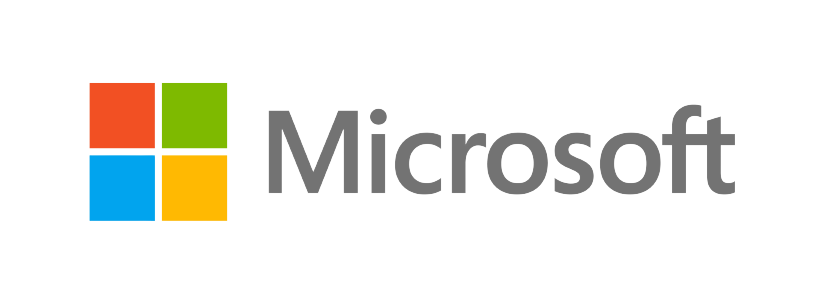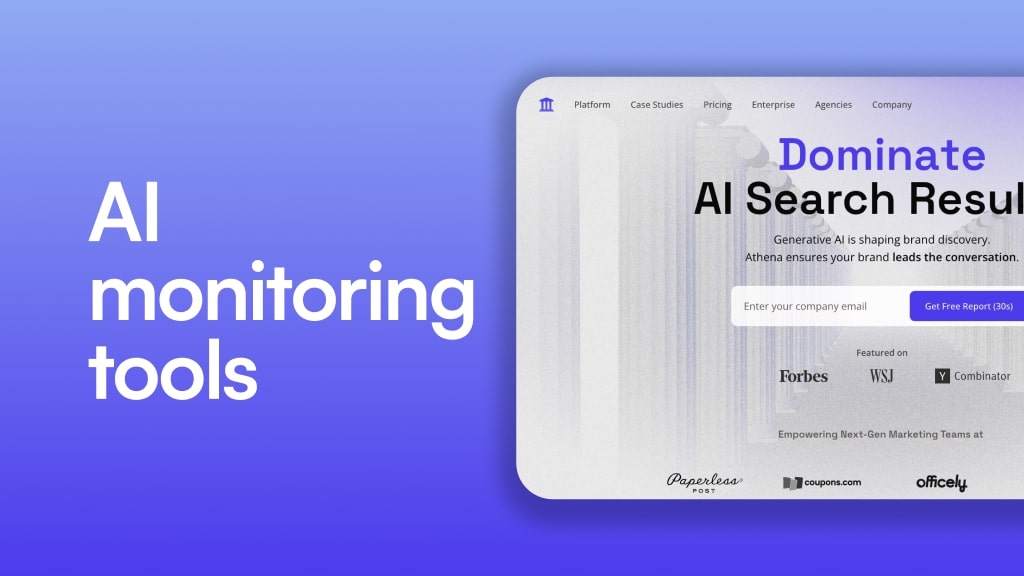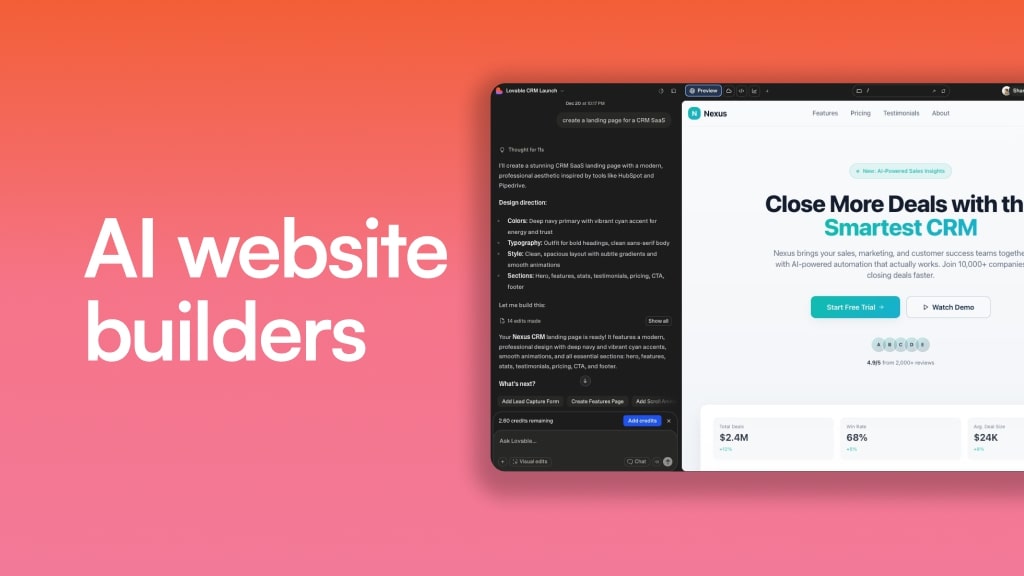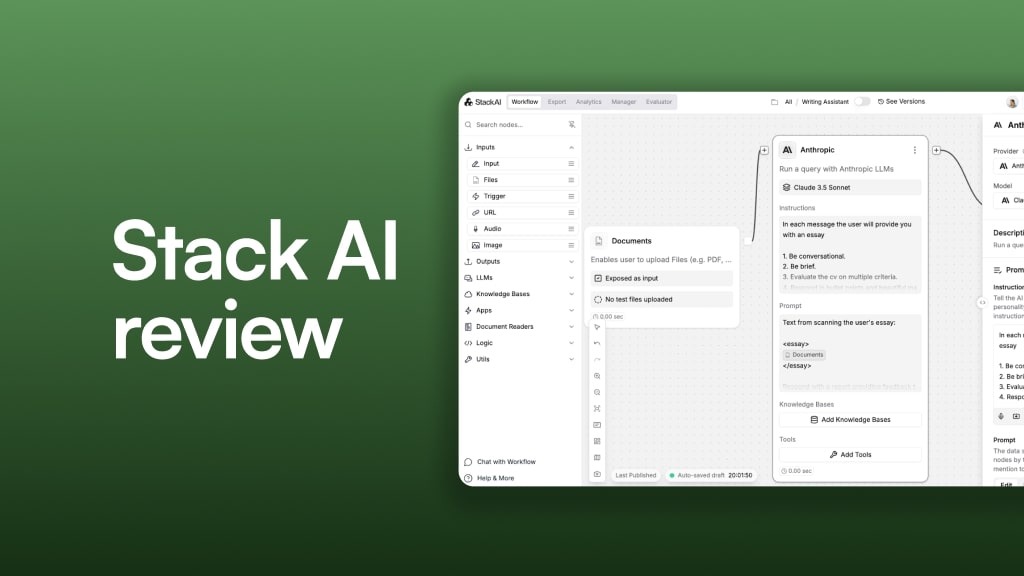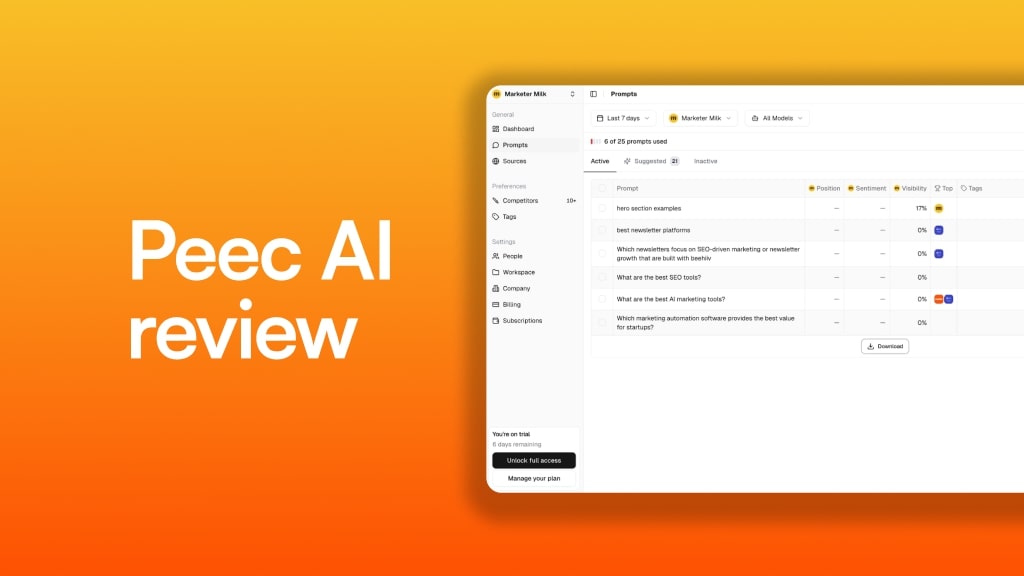I’ve been doing SEO for nine years, and believe me when I say I’ve never seen so many new tools popping up.
There are so many AI monitoring tools and visibility platforms coming out everyday. And honestly, it can be overwhelming trying to figure out which ones are actually worth checking out.
That’s why I’ve spent the past 6 months just testing as many of these tools as I can. And I’m finally ready to show you some of my favorite ones right now in 2026.
If you want to get recommended in LLMs like ChatGPT, Claude, Grok, and other AI platforms, you need to know how you’re currently showing up.
You can grow what you can’t measure.
If your boss is annoying you about this whole AI thing, and you’re not sure how to grow your traffic from LLMs, you’re probably not far off from making it a reality (you just need to make a few tweaks).
So in this article, I’m going to show you some of my favorite AI visibility trackers so you can figure out your brand presence in AI search, and whether or not your brand is currently being recommended (or not) by LLMs. I’ll also show you how to show up in LLMs once you’ve figured out your standing.
And, the last tool on this list, is one you can implement today after reading this post, without spending a dime.
Alright, no more rambling from me. Let’s get into it.
What is an AI monitoring tool?
An AI monitoring tool (also known as an AI visibility tool) is a platform that lets you track how your brand is being recommended by LLMs and AI search engines. These tools analyze real-time AI answers across AI platforms like ChatGPT, Claude, Perplexity, and Google's AI Overviews to show you where (mentions) and how (citations) your brand shows up. Think of it as Google Alerts, but for AI search results.
These platforms usually track brand mentions (when AI directly recommends your product) and citations (when your content is used as a source). Some tools even show you which competitors are beating you in AI responses so you can make tweaks.
How does an AI visibility tracker work?
An AI visibility tracker works by tracking when your brand appears in certain prompts. It’s pretty much a prompt tracker.
You give the tool a list of prompts like "what is the best productivity app" or "what are the best CRMs for accounting firms," and it runs those prompts across different LLMs to see if your brand shows up. It's like how traditional rank tracking software works for Google, except instead of tracking your keyword positions in search results, you're tracking whether prompts mention you.
The main limitation though is that you need to know what prompts to track in the first place. Unlike Google where you can use tools to discover new keywords you're ranking for, with LLM tracking tools you're kinda flying blind. You have to guess what questions people might be asking about your industry.
There are a couple exceptions on this list (like AI Product Rankings) that can run automations to surface prompts you didn't know about. But for the most part, these tools only track what you tell them to track.
But, I’m optimistic. My prediction is that this will all change once platforms like ChatGPT, Perplexity, or Claude launch their own ad networks. When that happens (and I'm betting it's not too far away), we'll finally get visibility into all the prompts driving traffic, just like we do with Google Search Console today. And you can bet every tool on this list will scramble to add those features the second they become available.
Until then, we're stuck playing a guessing game with prompts. But, it is better than having no brand visibility at all.
What to look for in an AI monitoring software?
After signing up, testing, and using dozens of these tools, I’ve come to conclusion that they all have their pros and cons. And unfortunately, there are a lot of grifters in this space. So while I do think all of the tools below are trustworthy to some degree, I think it’s important that you know how to make a good decision on your own.
Here’s what I think you should look for in an AI monitoring tool:
- Gives you value before asking for money. A handful of the tools I mention below have free plans and give you free reports. They want to show you the value they can bring before taking your credit card information. But some tools will show you nothing and ask for you to give them a hefty amount of money. Be careful with those tools and book a demo before you pay for them.
- Gives you prompt ideas based on topics. Some of these tools require you to give prompts to track (in fact all of them do). But how do you know what prompts to use? Well, a few tools have features that will help you generate prompts based on keywords you rank for — these are the platforms to really consider using.
- Study the team behind the tool. Is this a real company? If they raised money, are they backed by trustworthy investors? Make sure whatever product you use (even outside of this list) is from a team that you know cares about you (not just your money).
- Great UI/UX. Analytics tools are something you look at every day. You don’t want the tool you use to be an eye sore. Luckily, most of these (with the exception of a couple) have amazing interfaces.
- Safe and secure. If any tool asks for you to integrate your data, make sure it’s secure and encrypted. Look out for tools that are SOC 2 compliant, especially if you’re a large brand.
The list can go on, but these are some of the essentials. The list below will go over me using each tool so you should get a feel for how I think about each tool before you even sign up.
This article is also 100% written by me and I didn’t use AI so you can see my thought process in how I think about these tools.
Alright, let’s get into the list!
10 best AI visibility tools and monitoring software in 2026
Here are the best AI visibility tools:
- AI Product Rankings
- Peec AI
- Profound
- Scrunch AI
- Hall
- Nimt.ai
- AthenaHQ
- Mentions
- BrandLight
- Google Analytics 4 (with an LLM filter)
Okay, let’s go over what each one does.
1. AI Product Rankings
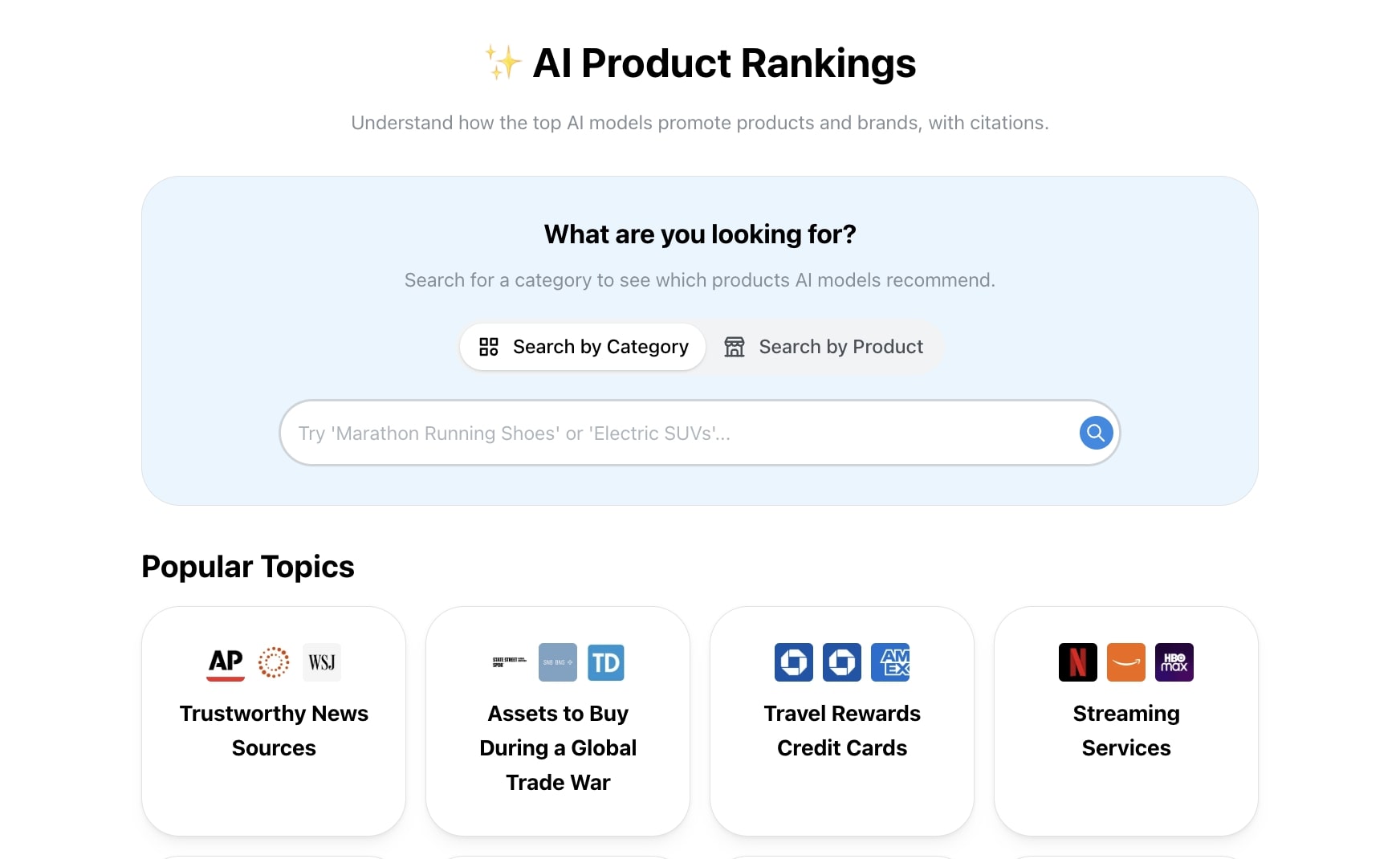
- Best for: Brands of all sizes
- What I like: Let’s you see mentions and citations for topics
- Pricing: Free
First on our list is AI Product Ranking. This tool is so cool because it lets you see how your website is doing right away in AI search engines, without having to create an account or pay for anything.
The product was made by two young Y Combinator founders. They’re still working on their full project, but they built this free tool as a sort of lead magnet to gauge interest in AI visibility tools. In fact, their company is named Gauge if you want to check it out.
On the AI Product Ranking website, you can either search by category or by product (aka your brand). For example, I did a search for the category “ai marketing tools”. Here I can see not only the brands being shown, but also all of the citations.
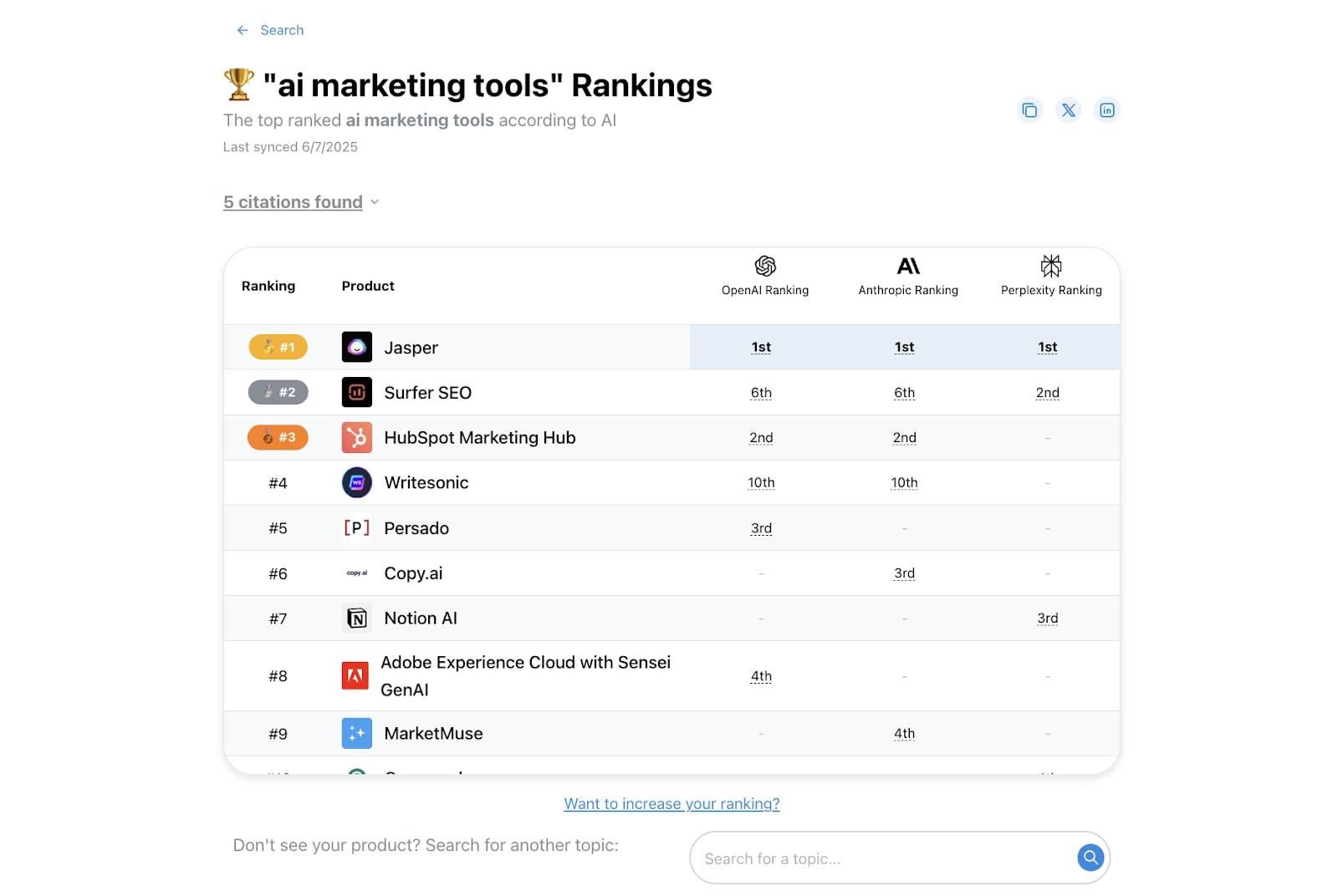
I can also share the report as well. It’s insane cause this is all free! And when I click on the citations found, I can see all of the pages that are used in OpenAI, Anthropic, and Perplexity for aggregating the brands shown in LLMs.
For this topic, you can see I’m one of the top citations for this topic.
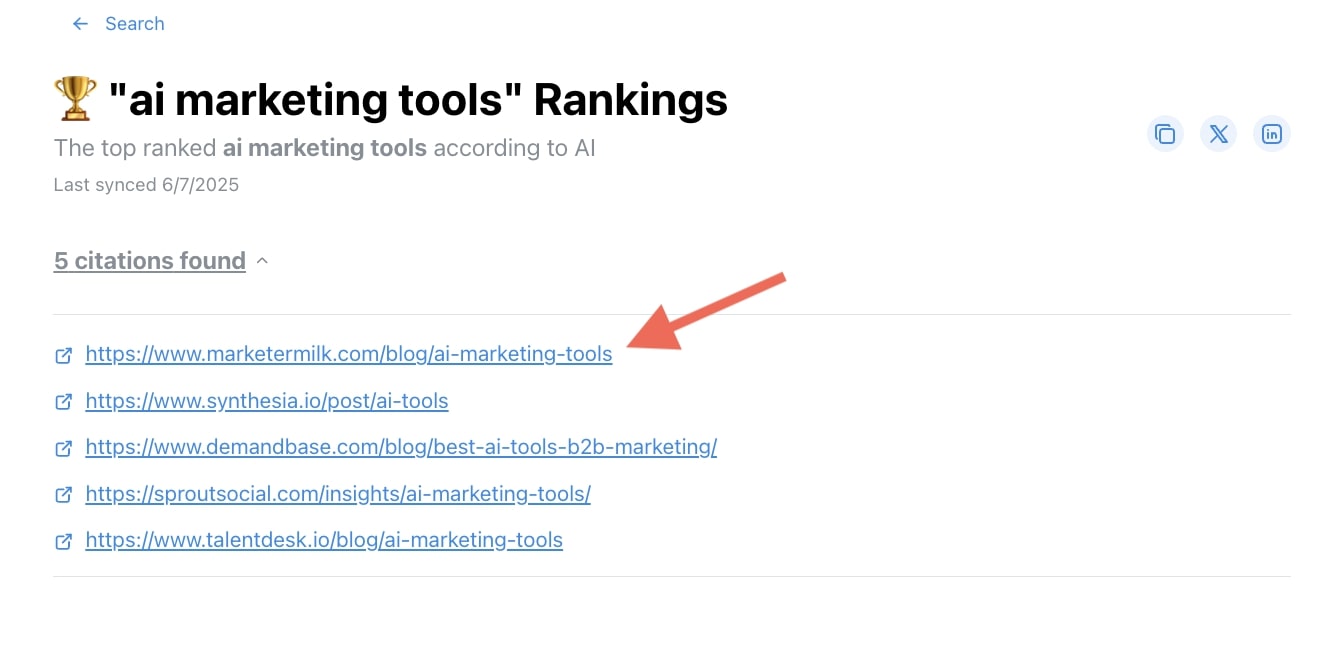
Gosh I love SEO haha.
But this is so valuable because if you’re a media publisher, you can see the value you bring to brands. And if you’re a brand trying to get mentioned by LLMs, you can see which publishers have the most influence on results (and maybe it might be worth reaching out to them).
I absolutely love this tool, and it’s why I placed it in the first spot. They are not paying me to say this. In fact, none of the tools on this list know I’m writing about them. So rest assured I’m not being biased or swayed by these companies (and no shady backdoor deals going on).
Because this tool is just a simple website, and free, there isn’t a price to report on (like I will with other tools). There are also no third-party reviews cause it is a tiny site (I'm surprised more people don’t know about it).
But if you want my personal opinion: I love it, and you should check it out.
⭐️ Marketer Milk score: 5/5 stars
2. Peec AI
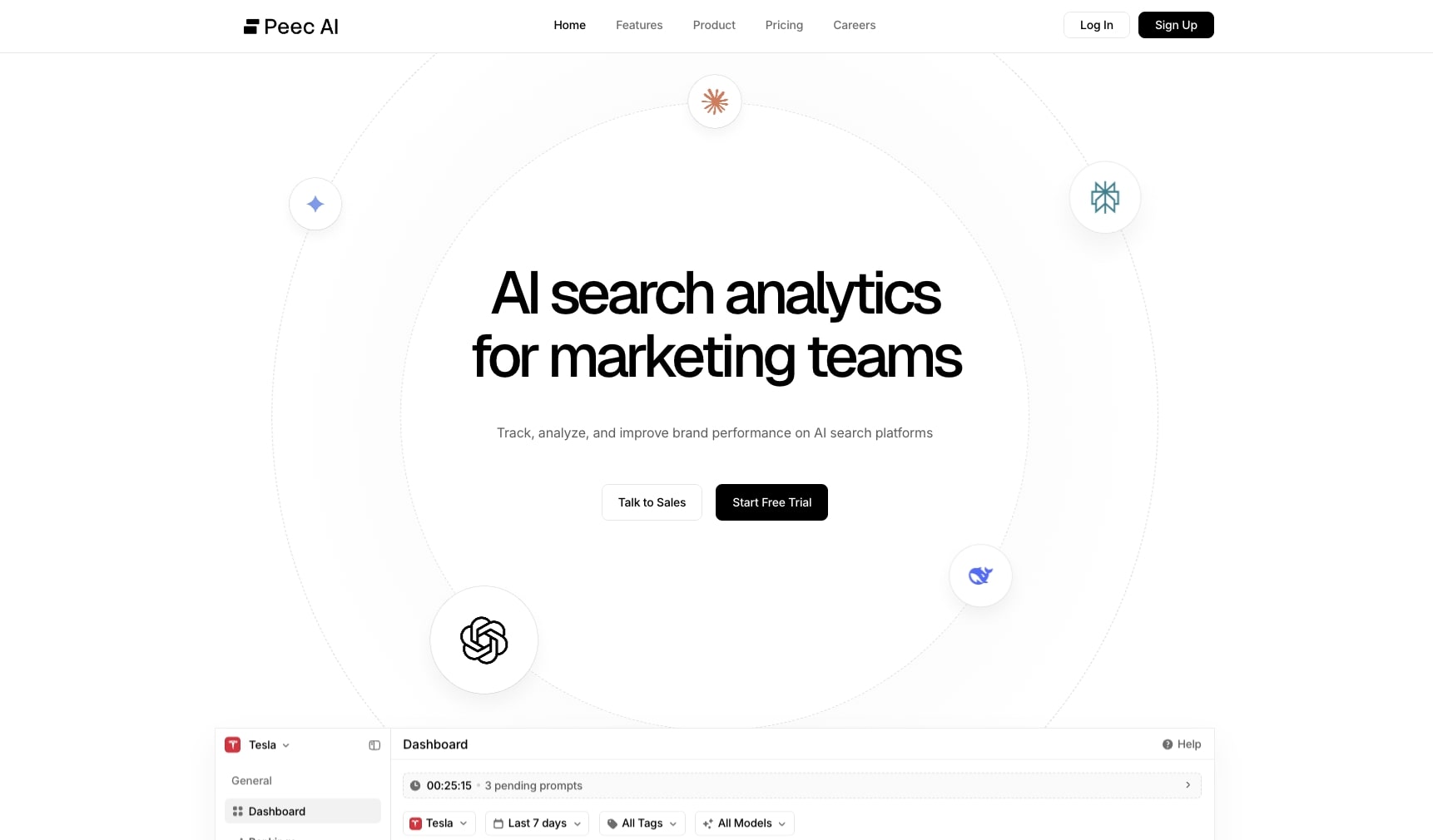
- Best for: Products with existing branded search
- What I like: You can easily analyze competitors
- Pricing: Free 7-day trial, then starts at $89/month
Next up is Peec AI. This is a tool I’ve been recommended a handful of times by my friends running SEO agencies. So I had to test it out for myself. And… I’m thoroughly impressed with it.
The platform is designed for agencies and in-house teams looking to improve their AI visibility monitoring and “start winning in AI search.” Their words not mine. I guess what they’re trying to say is the platform helps you uncover how you’re currently doing in LLMs and then tells you how to improve your visibility.
What I love about this tool is that it feels so premium. The onboarding process is fantastic, and it starts with you inputting your website to get a report.
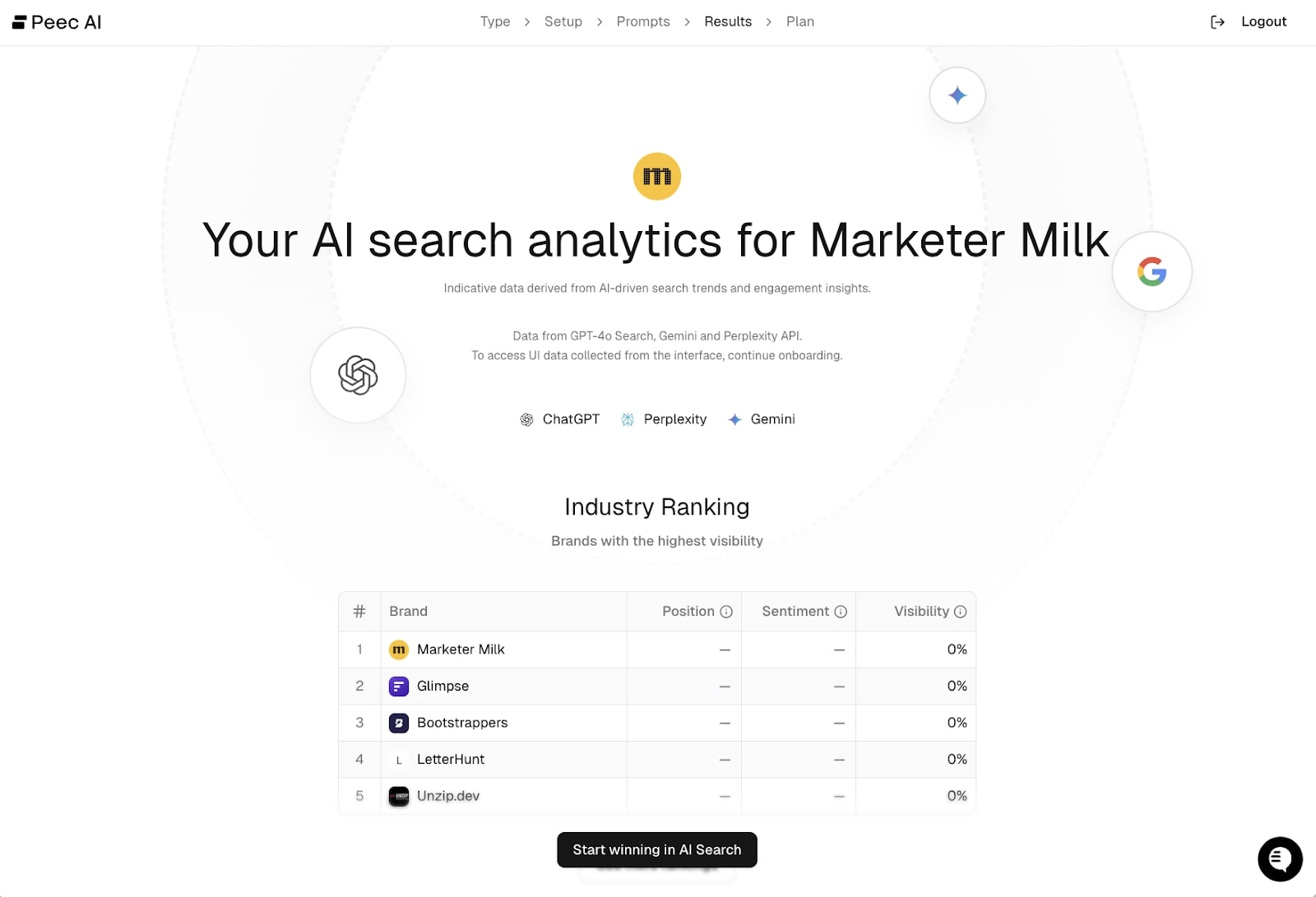
Once you start your free trial, you’ll be prompted to an unlisted YouTube video that shows you how to get started with the platform.
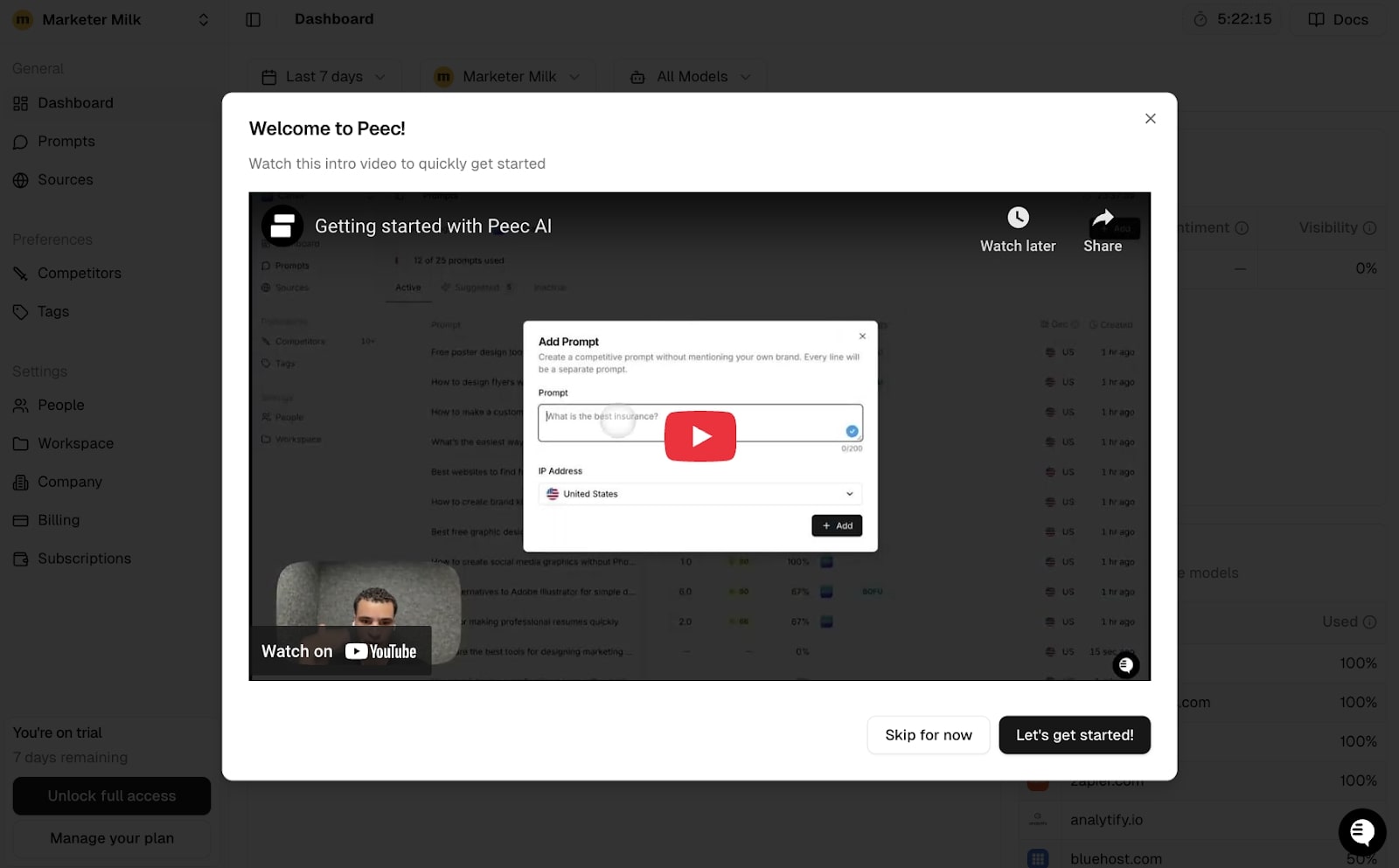
I really wanted to embed the video in this blog post, but out of respect for the team at Peec (because it is intentionally an unlisted video) you’ll have to start your trial to view it.
When you log in, this is the dashboard:
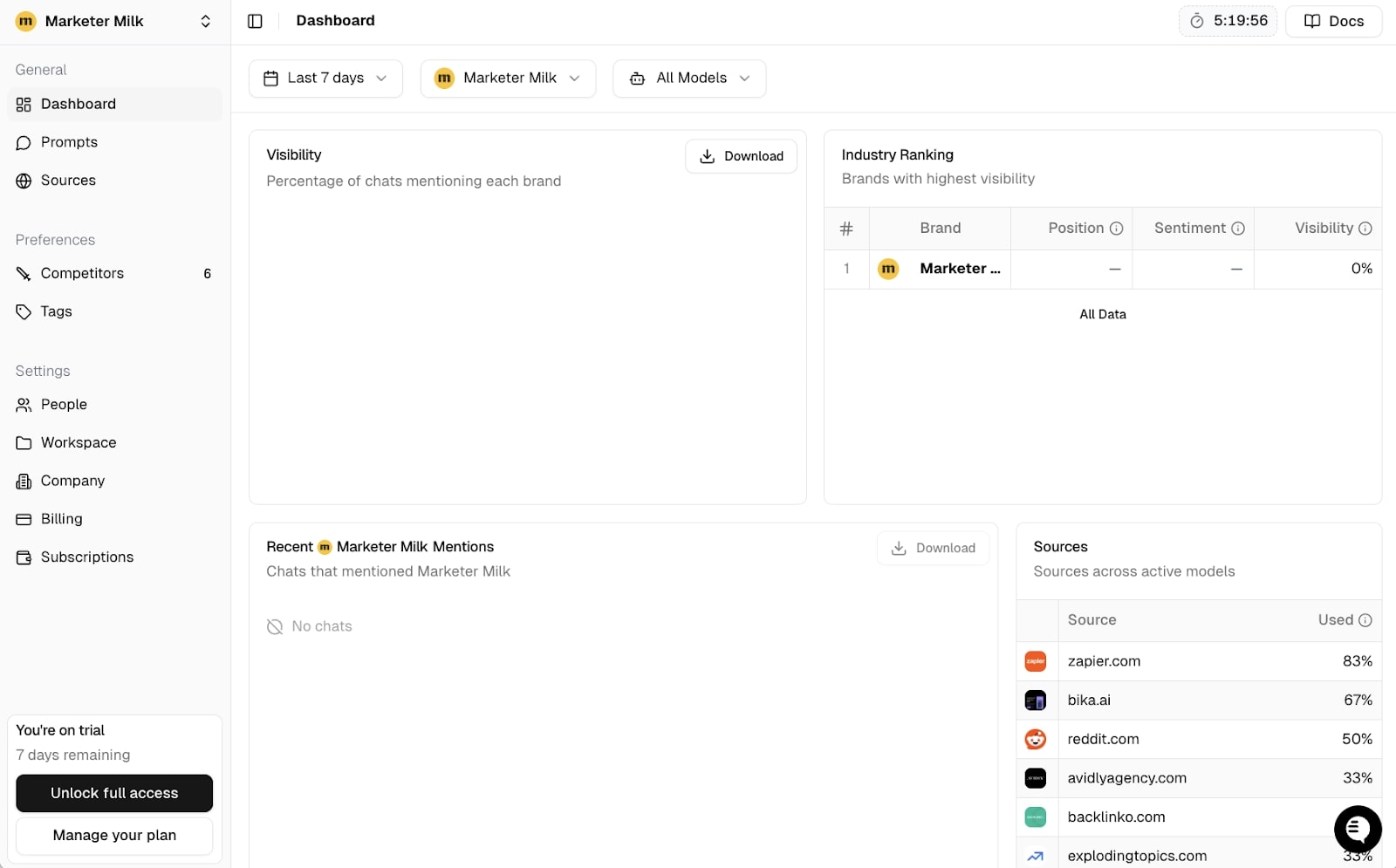
Right away, I can see “Sources” in the bottom right corner. I imagine these are sites being cited that are similar to yours. I’m using this website, Marketer Milk, for my account. And the sites showing up are websites I recognize that rank for some of the same keywords I am (albeit in Google search).
In the ‘Prompts’ tab on the left sidebar, there are already a few prompts preloaded that are related to my site.
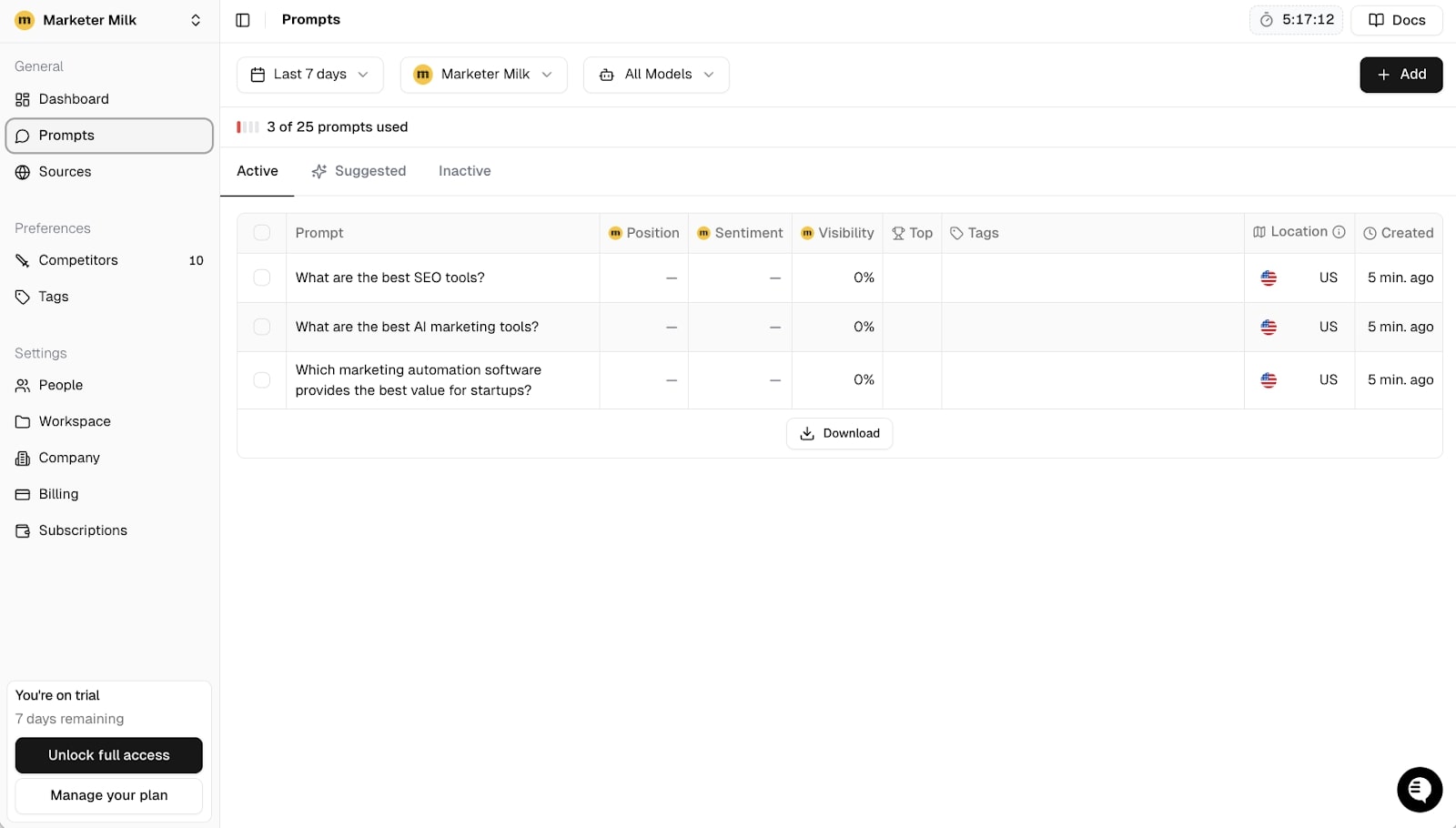
And when I click on one of the prompts, I can see a full breakdown of the prompt analysis:
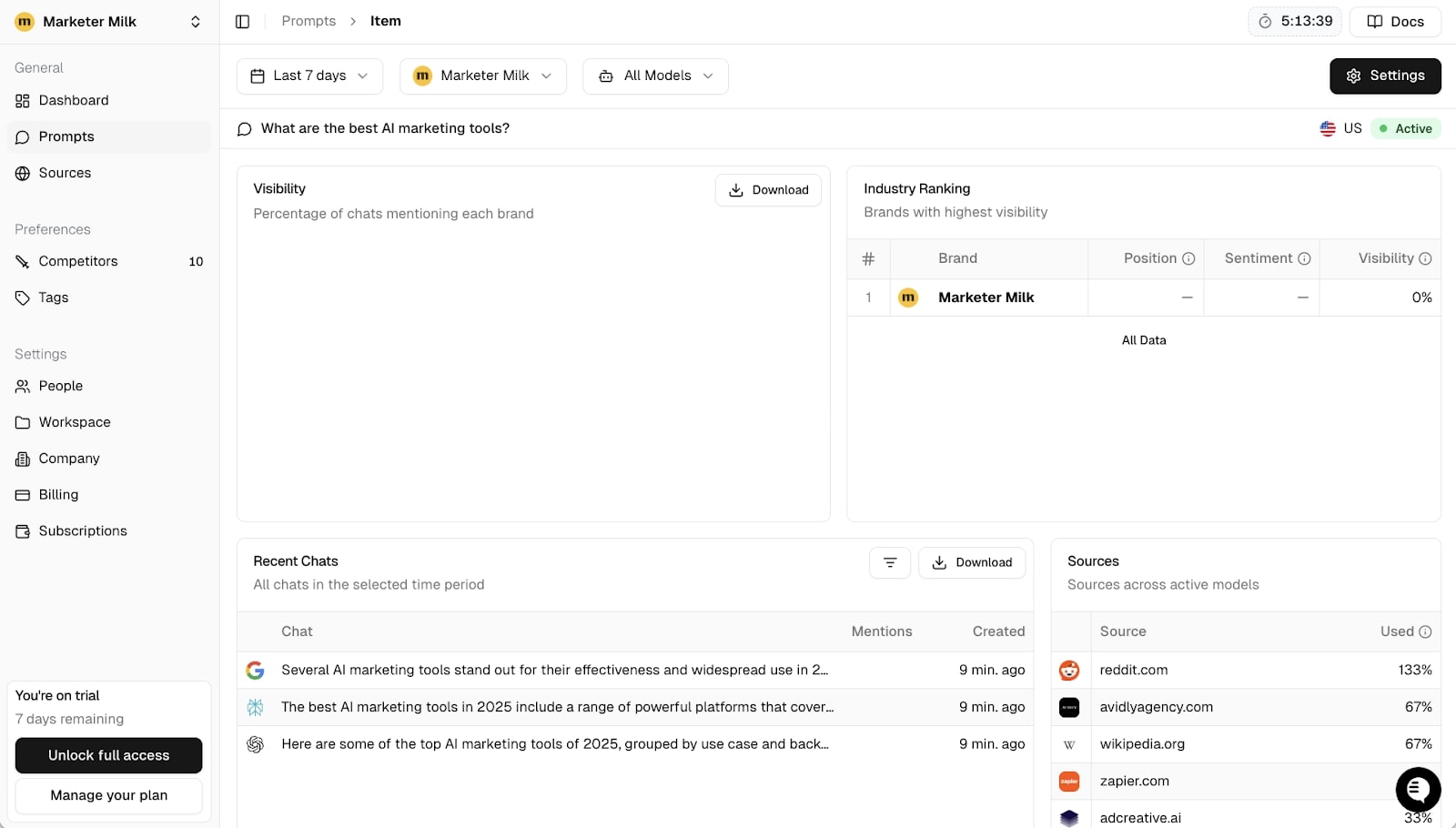
But, what I realized while using Peec AI is that this works best if you are a brand that is recommended, not a publisher that gets cited. For example, there is little to no brand visibility being shown for Marketer Milk as a brand that is mentioned in LLMs.
Yet, I come up for a lot of prompts as citations and even in the Search future on ChatGPT. In fact, I get around 5,000 visitors a month just from LLMs currently (and it’s still a fraction of my total traffic).
But the great thing about Peec AI is you can also analyze competitors for benchmarketing purposes. So I tested this with a the brand beehiiv. And OH MY this is so much better.
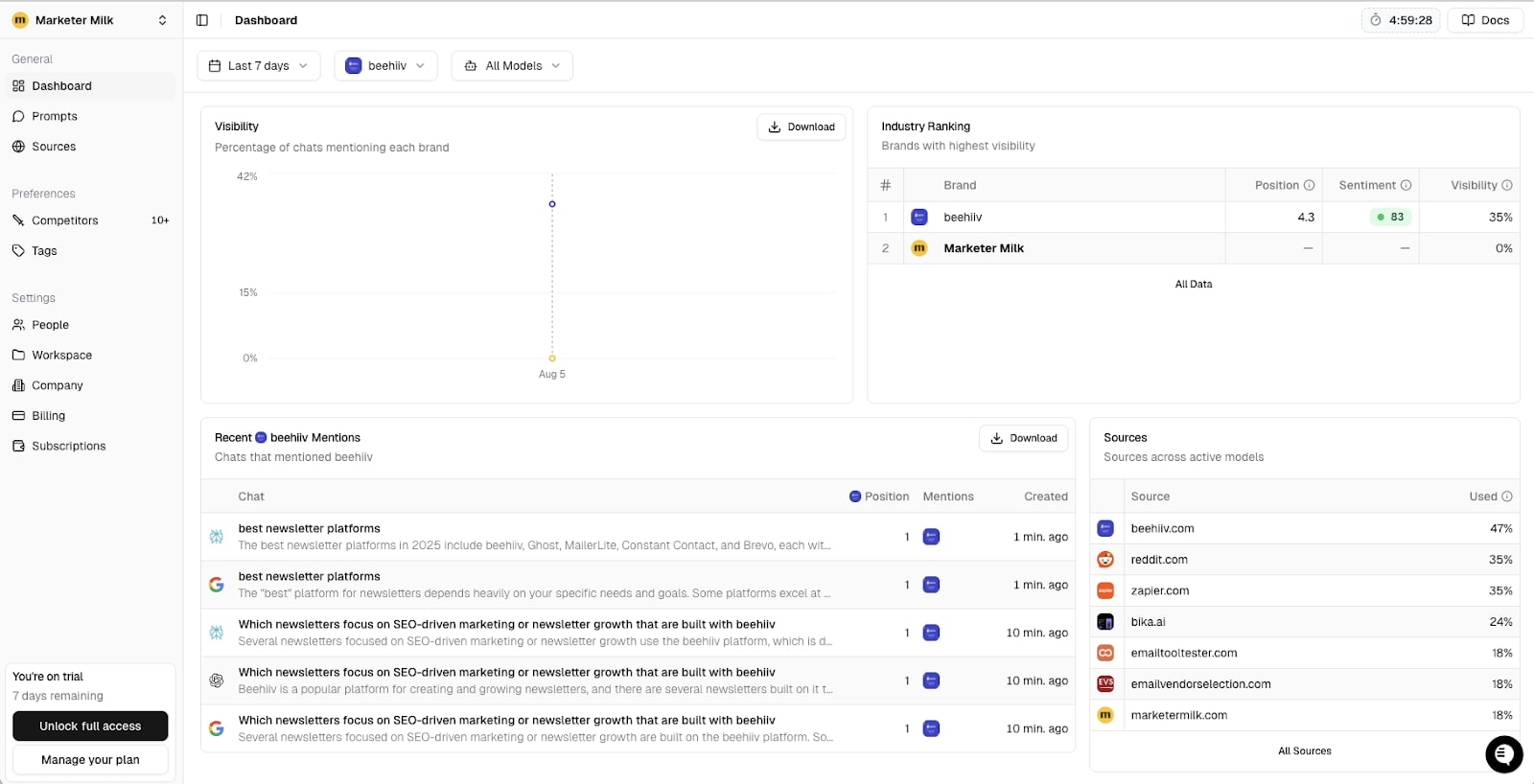
The screenshot above shows beehiiv’s standing. I can see the visibility score, the prompts the brand is showing up for (that I set), and also the sources that recommend beehiiv. Oh look, I’m a source!
So ya, Peec AI is awesome. But, it works best if you’re already getting a decent amount of branded search. As you can see, when I tested it with my blog, it didn’t give me a lot of data. But when I tested it with an actual product, it was populated with some useful information.
Peec AI pricing
Here are Peec AI’s pricing plans:
- Starter: $89 per month, track up to 25 prompts
- Pro: $199 per month, track up to 100 prompts
- Enterprise: Starts at $499 per month, track over 300 prompts
If you want to check out all of the features included in each plan, you can check out their pricing page here.
Peec AI rating and reviews
Here’s what users of Peec AI rate the platform on third-party review sites:
- Slashdot: 5/5 star rating (from +3 reviews)
- OMR: 4.9/5 star rating (from +11 reviews)
I also wrote a super in-depth review of Peec AI if you want to check that out.
⭐️ Marketer Milk score: 4.9/5 stars
3. Profound
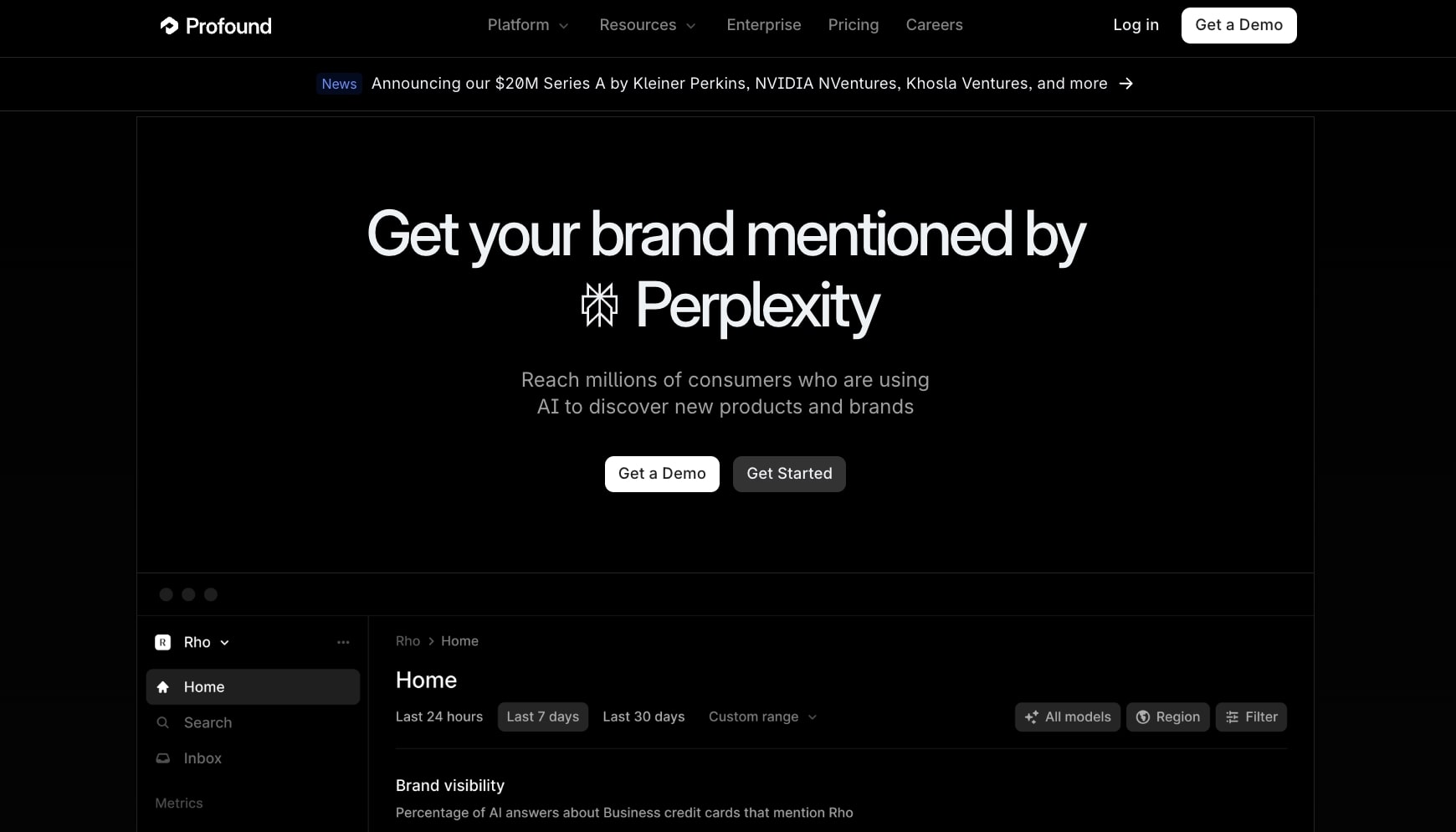
- Best for: Established tech startups that are scaling GTM efforts
- What I like: Helps you find relevant conversion about your brand
- Pricing: Starts at $499 per month
Profound is an AI SEO tracker and visibility platform that is very well known. In fact, I believe this is the first tool that really popped off in the AI search monitoring tools space. Many other tools followed them.
Profound is a very premium tool. What I mean is that they focus very up-market, on the big enterprise companies. But what makes this tool really stand out against its competitors is the Conversion Explorer feature.
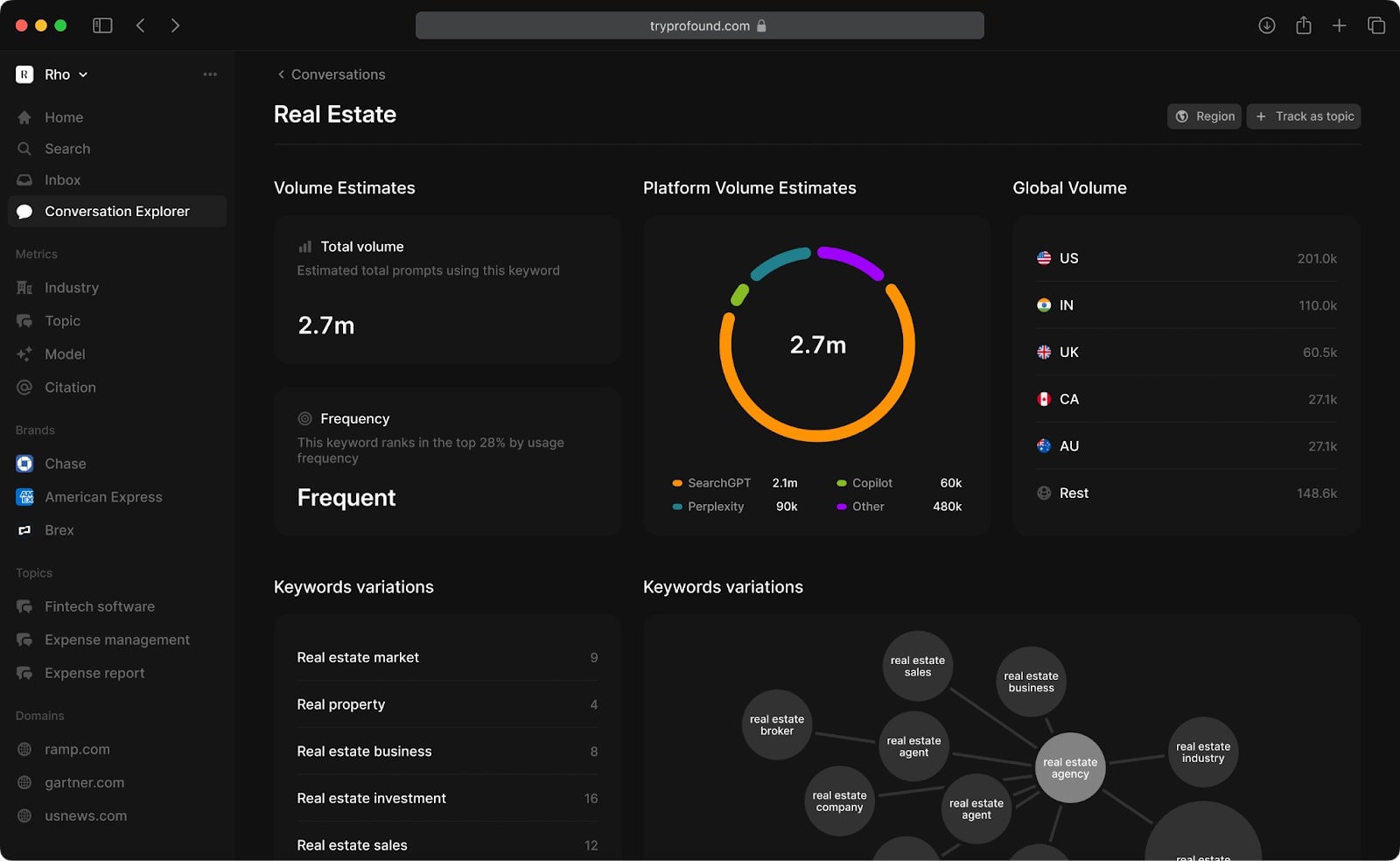
While most AI monitoring platforms need you to give it prompts to track, Profound has fused elements of traditional keyword tools, like Semrush and Ahrefs, and used that data to help uncover prompts you may not be thinking about.
This is so sick.
When you sign up to use Profound, you go through a similar onboarding process as Peec AI. And it does take some time for the platform to analyze your site. I got stuck on this screen for about 5 minutes:

But after it loads, you go through an onboarding process that is actually pretty cool. It already gives me ideas of what to track based on its analysis of my website.
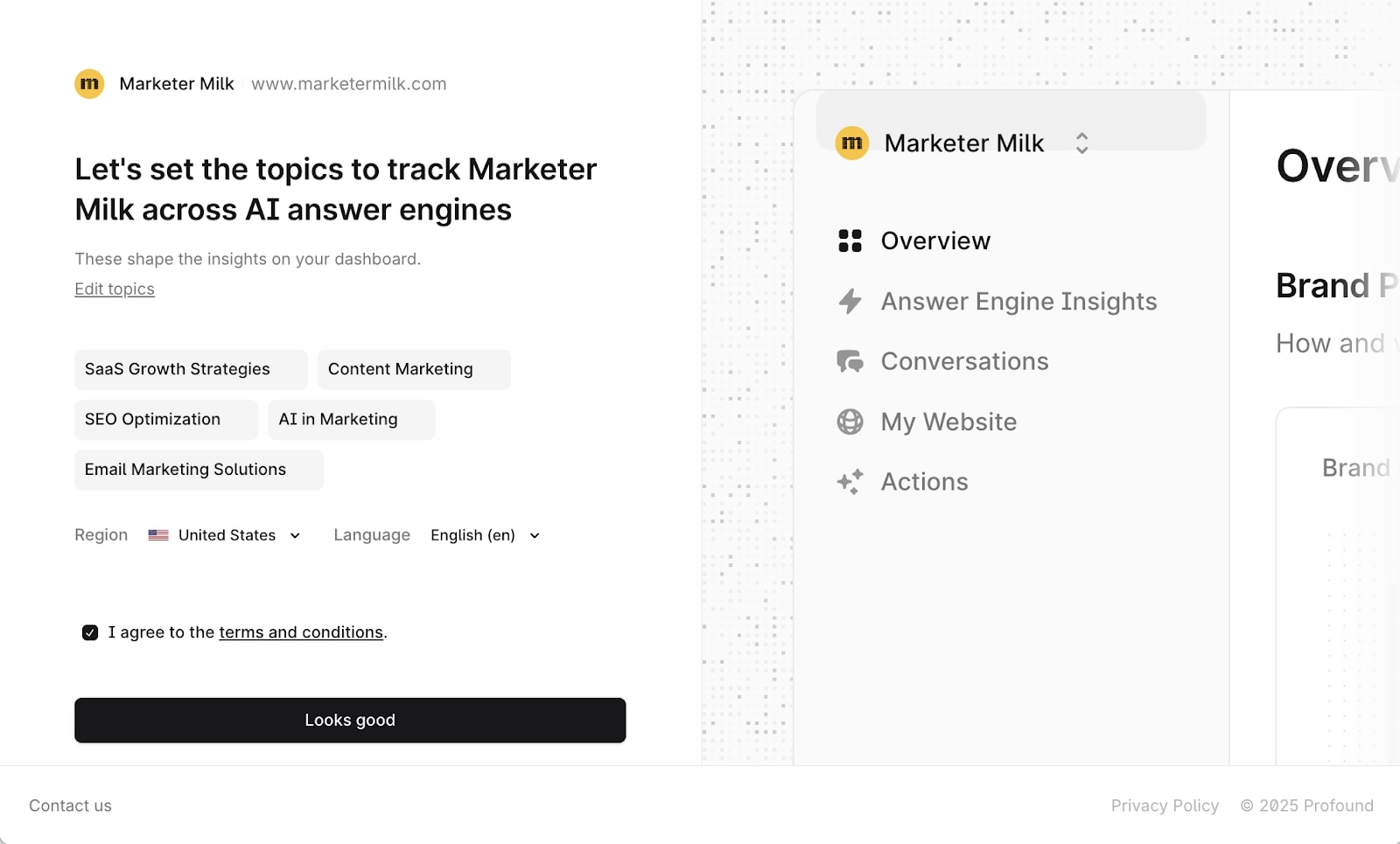
I would say these topics are pretty spot on.
It does tease you though. As you have to pay to see your data populate. I have a friend who leads marketing at a really big company who showed me their dashboard. I wish I could show it but I can’t for privacy reasons.
But, here is what the dashboard looks like:
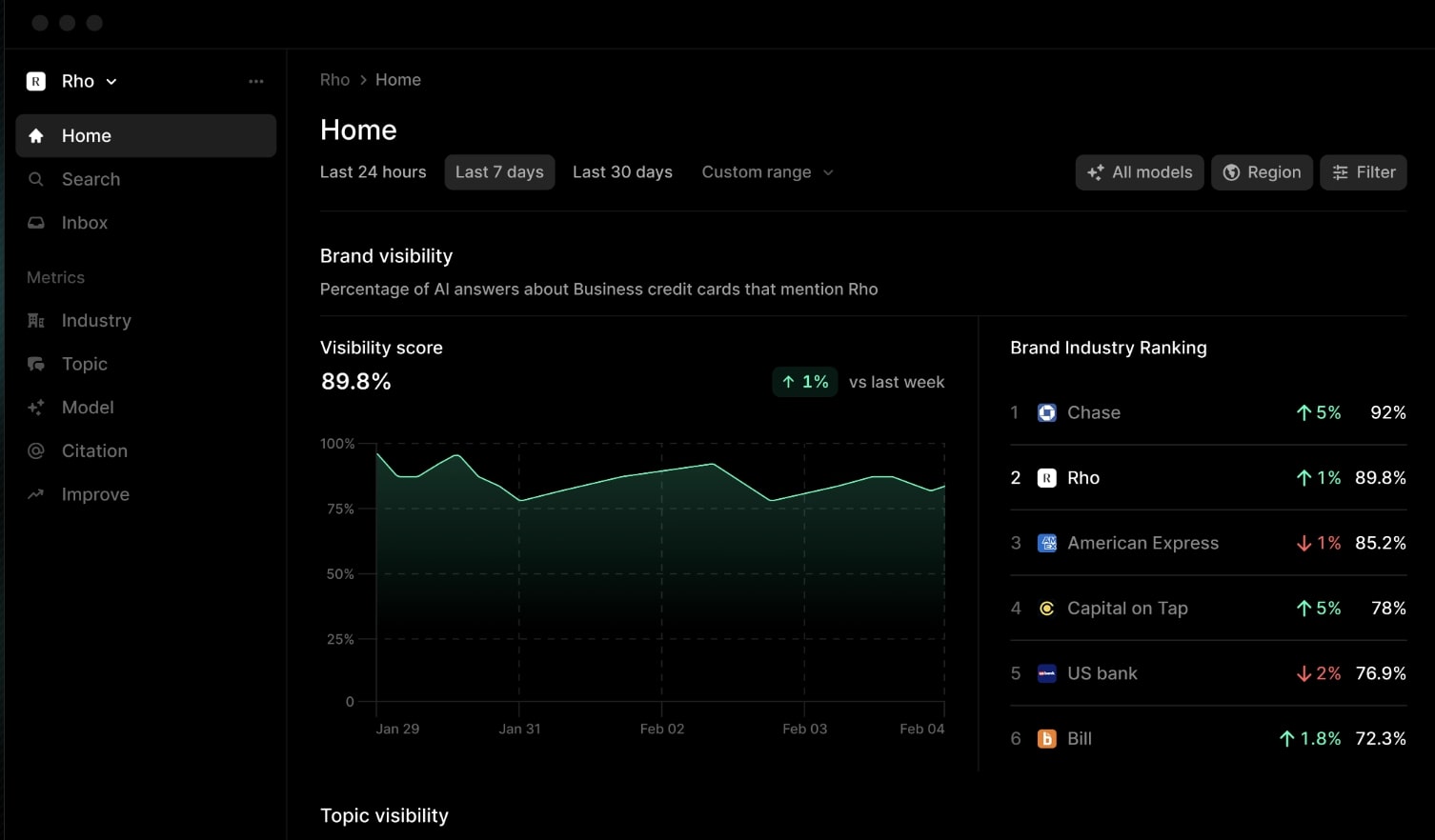
I predict that they will eventually have some sort of trial like Peec AI does. At least, I hope.
Overall, if you’re a big brand, Profound is definitely worth checking out. If you try to use the self-serve option like I did, you might get frustrated. The analyzing screen took so long that I didn’t even want to use the tool anymore. But that’s because I’m impatient. The actual data is pretty legit.
Right now, we are seeing SEO tools like Ahrefs and Semrush trying to hop into the AI search/GEO game. And we are seeing new companies just focusing on GEO stuff. But I think Profound will evolve into a larger SEO analytics tool, that is GEO-first. It may be the first of it’s kind.
Profound pricing
Here are Profound’s pricing plans:
- Profound Lite: $499/month, gives you access to the main AI search engines
- Enterprise: Custom pricing, gives you access to more niche AI search engines
The pricing plans also move based on how many sites you want to track, the frequency of real-time tracking, and how many AI-generated answers you want to analyze per month. You can check out exactly what each plan offers here.
Profound rating and reviews
Here’s what users of Profound rate the platform on third-party review sites:
- G2: 4.7/5 star rating (from +70 reviews)
- Slashdot: 5/5 star rating (from +1 review)
⭐️ Marketer Milk score: 4.3/5 stars
4. Scrunch AI
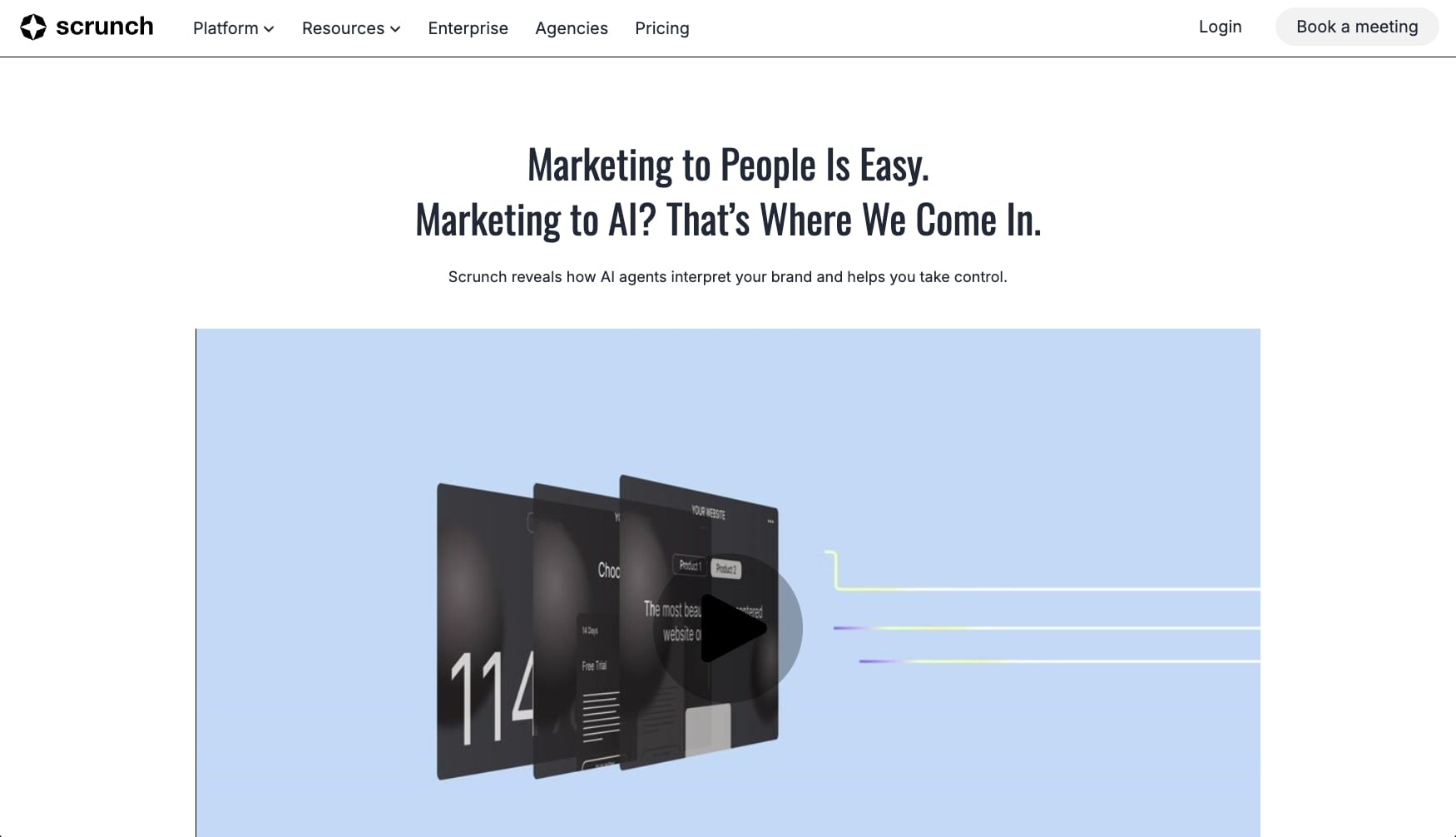
- Best for: Huge enterprise companies
- What I like: Gives you ideas for how to optimize content for LLMs
- Pricing: Starts at $300 per month
Scrunch AI is a brand monitoring tool that can understand how your website is being recommended in AI search engines like ChatGPT, Perplexity, and Google Gemini. It’s a tool that I’ve been recommended by a lot of friends in the SEO space.
I’ll be honest, the current site design is pretty outdated. A lot of people I know vouch for the tool, but the first impression of the site makes me question it.
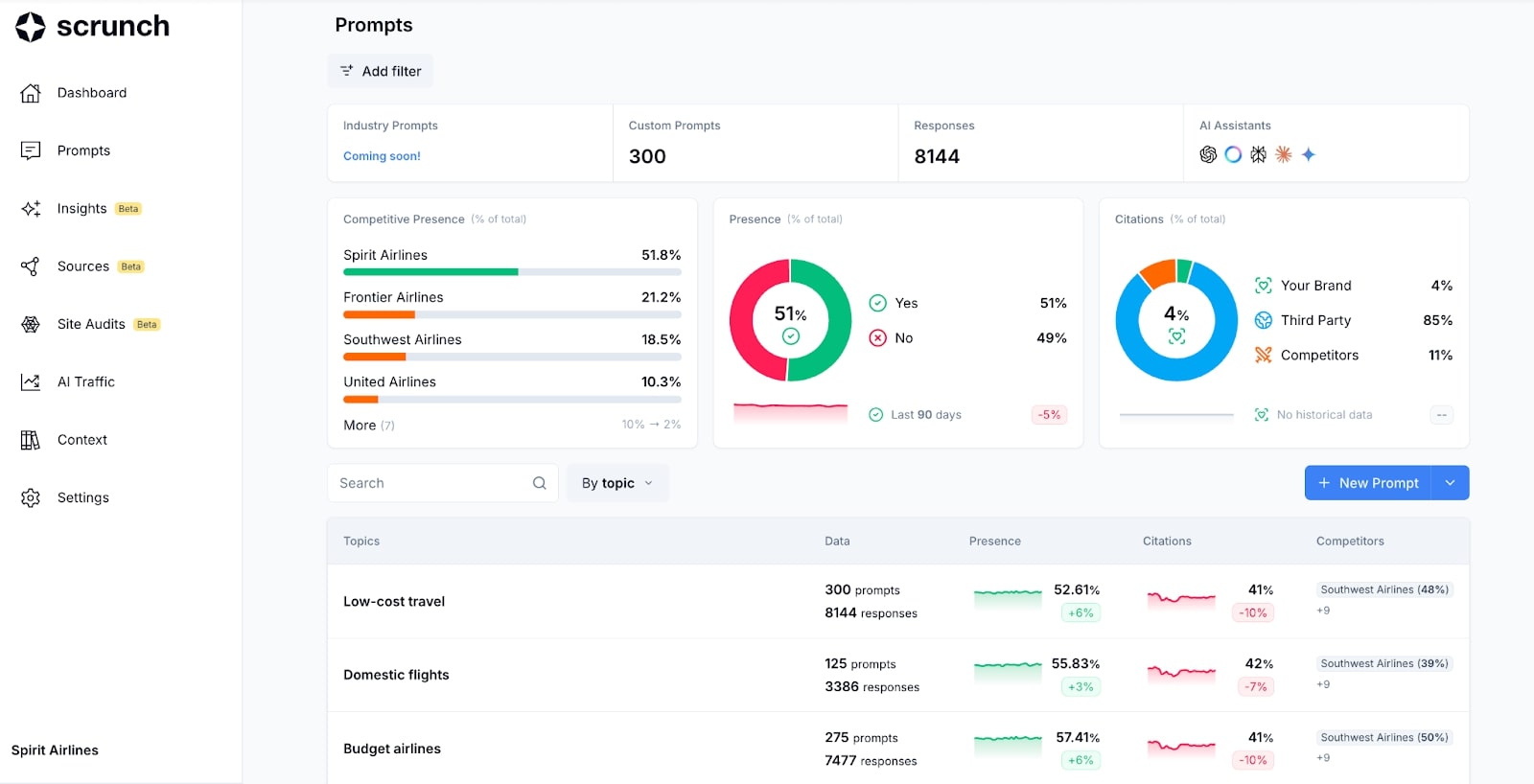
The tool is also focused on enterprises. And there is no self-service option like Peec AI. However, the tool is promising. It has features like:
- Monitoring: This lets you track citations and spot trends, pretty much the foundation of all of the tools on this list.
- Insights: This actually gives you ideas for how to optimize your content to show up better in LLMs. It’s quite unique as not a lot of tools in this space offer this (yet).
- AXP: This is their AI Agent Experience Platform that is in beta and helps you create an AI version of your website.
Overall, out of all of these features, AI-driven insights is probably my favorite one.
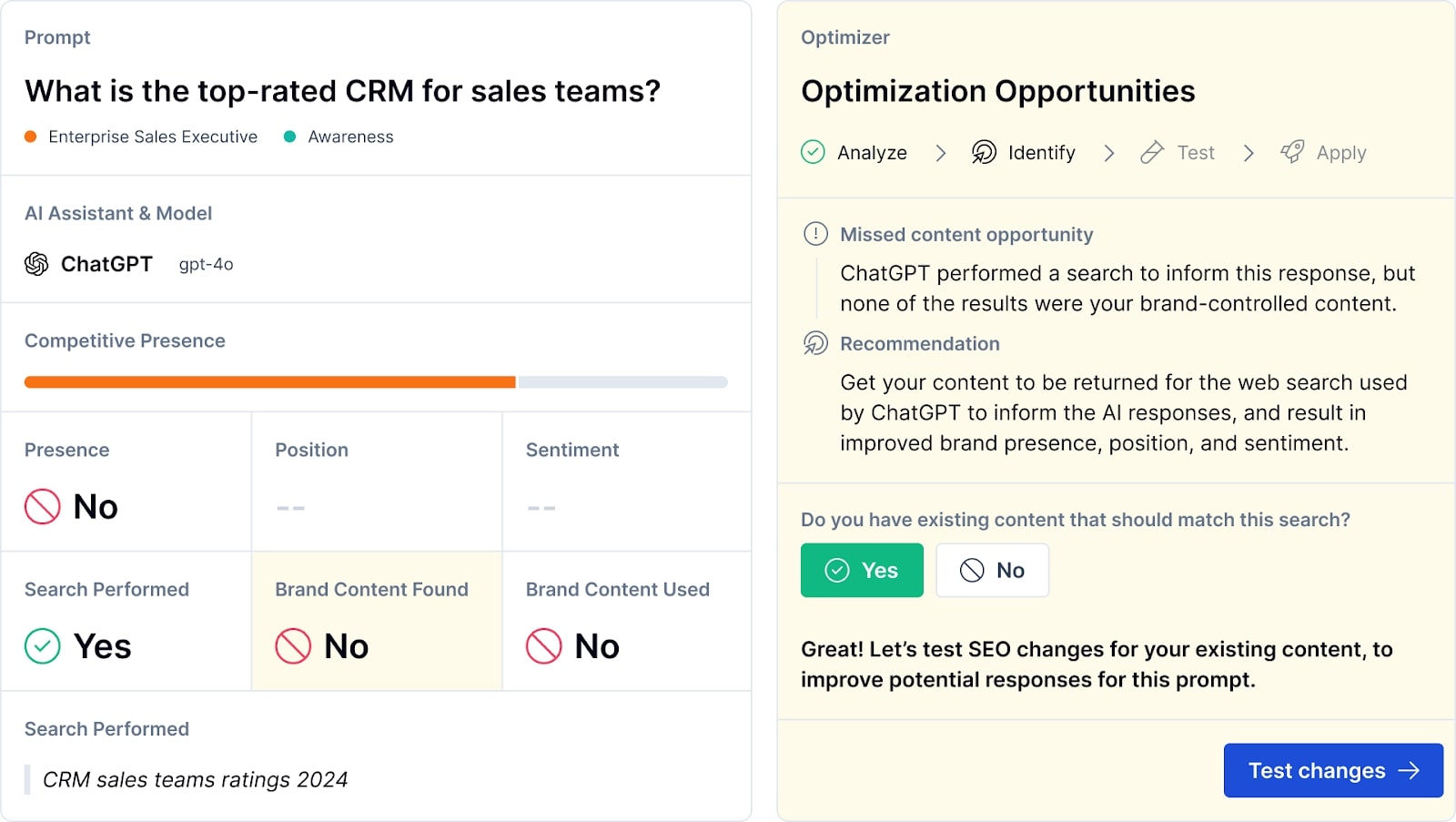
Many of these tools just show you data and information. But they don’t tell you what to actually do with it. I like Scrunch AI in this regard as they give you some action items to implement.
Scrunch AI pricing
Here are Scrunch AI’s pricing plans:
- Starter: $300/month, track up to 350 prompts
- Growth: $500/month, track up to 700 prompts
- Pro: $1,000/month, track up to 1,200 prompts
- Enterprise: Custom pricing with custom features
As you can see, Scrunch AI has the most pricing options out of the tools we’ve gone over so far. There are a lot of tiny options and features that are available for different tiers. So if you think this is a tool you want to use, you should check out their pricing page here.
Scrunch AI rating and reviews
Here’s what users of Scrunch AI rate the platform on third-party review sites:
- G2: 5/5 star rating (from +10 reviews)
- TechCrunch: Read a review they wrote
⭐️ Marketer Milk score: 4.5/5 stars
5. Hall
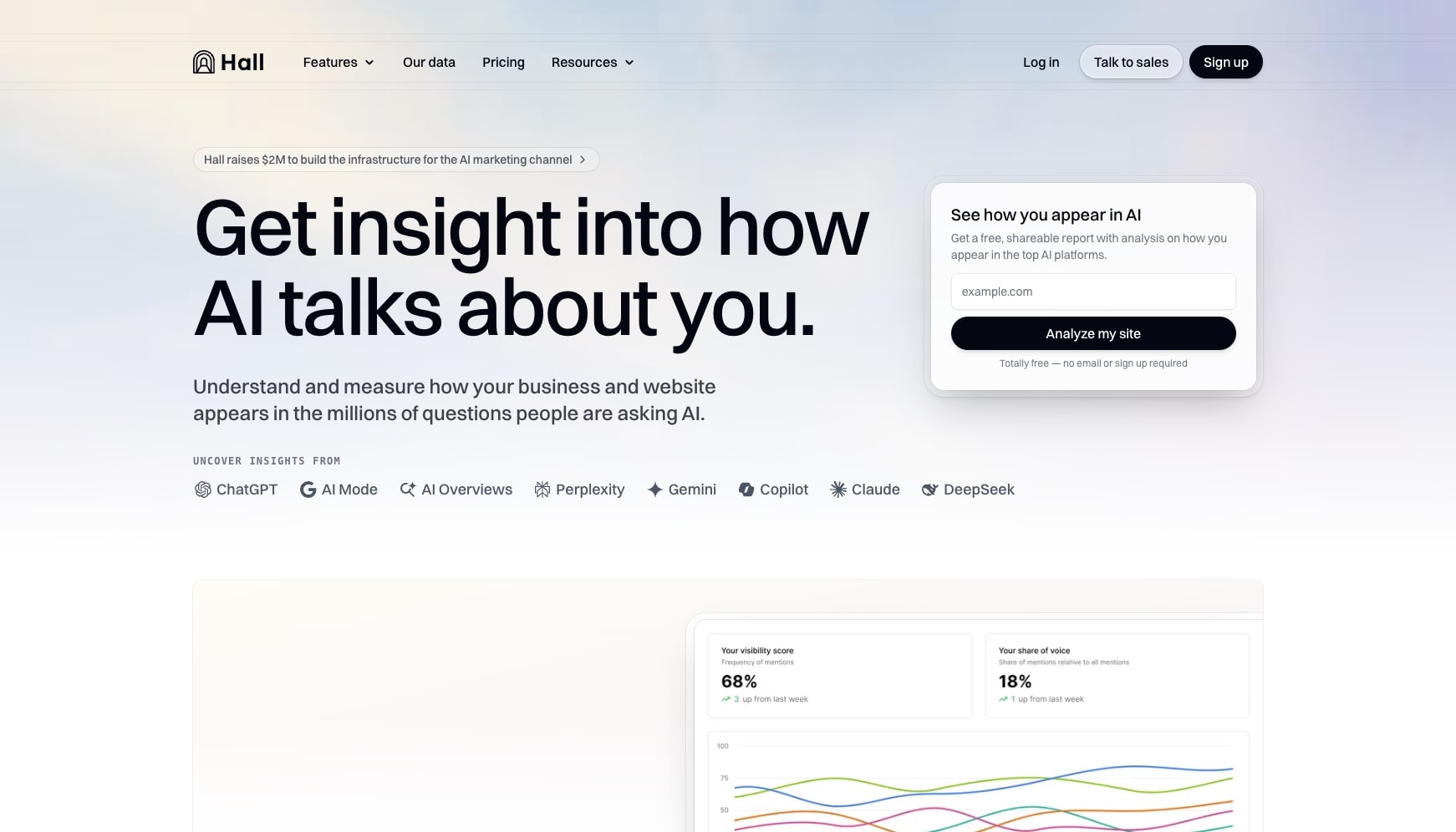
- Best for: Startups on a budge
- What I like: Gives you prompt ideas and shows your mentions clearly
- Pricing: Includes a free plan
Hall is a Generative Engine Optimization (GEO) platform built for AI search. At least that’s what they say they are. Based in Sydney, Australia, Hall is one of the tools I was really excited to use because of how well the website is designed.
After all, they’re Australians and Aussies have amazing taste when it comes to design and creativity — so I'm not surprised. But form, what about function. Their main CTA is to analyze your website. So this is what I initially did (make sure there’s no trailing slash after your URL).
Once you input your brand’s domain, you get a free mini report that you can share with anyone on your team. It also gives you visibility insights into your competitors, which I thought was pretty neat cause I recognize all of the companies it mentioned.
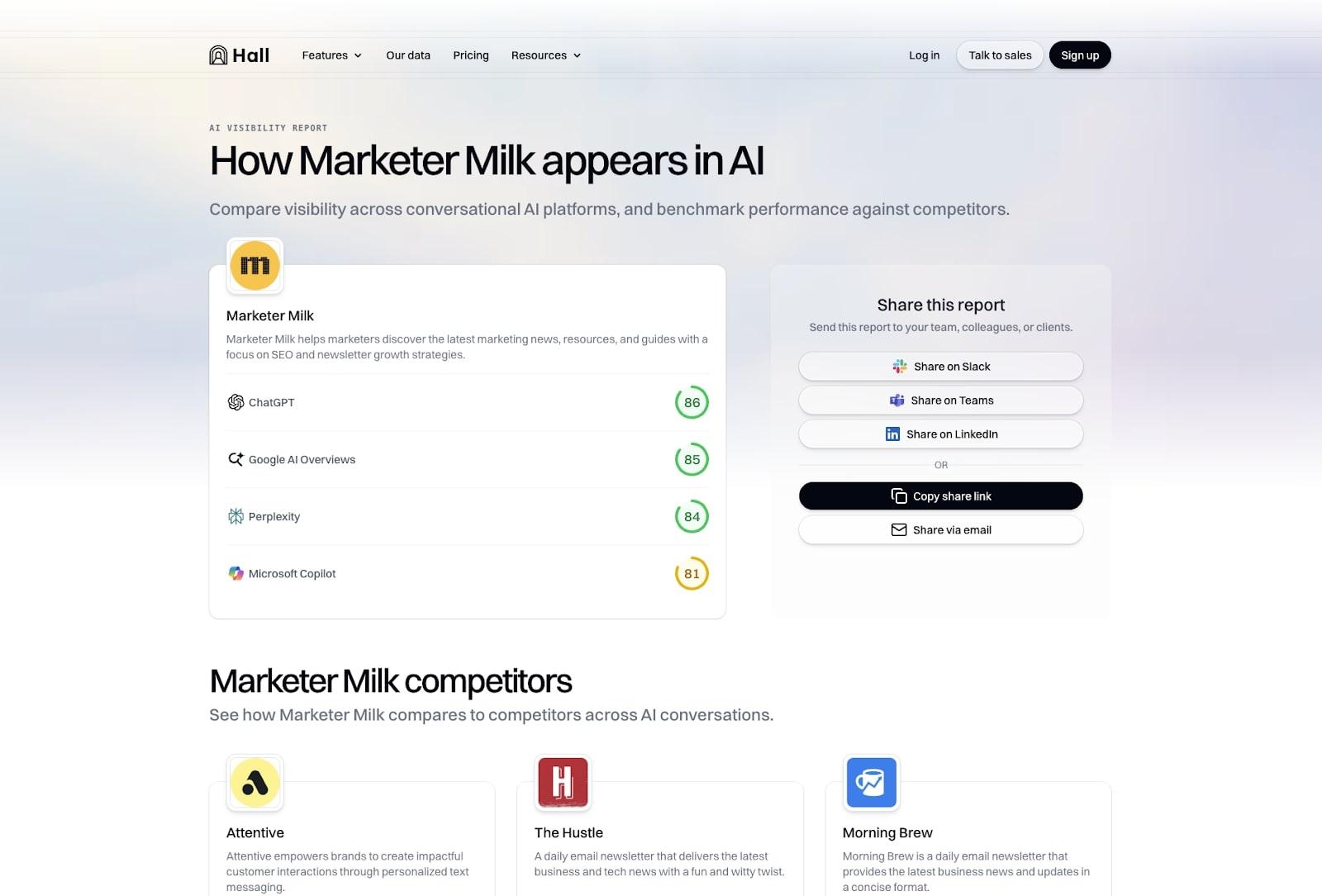
It looks like my site is fairly well optimized for AI search! But this is probably taking into account how I show up in citations. The funny thing is I'm wearing an Attentive hoodie right now as I’m writing this article (and it says they’re a competitor of mine lol).
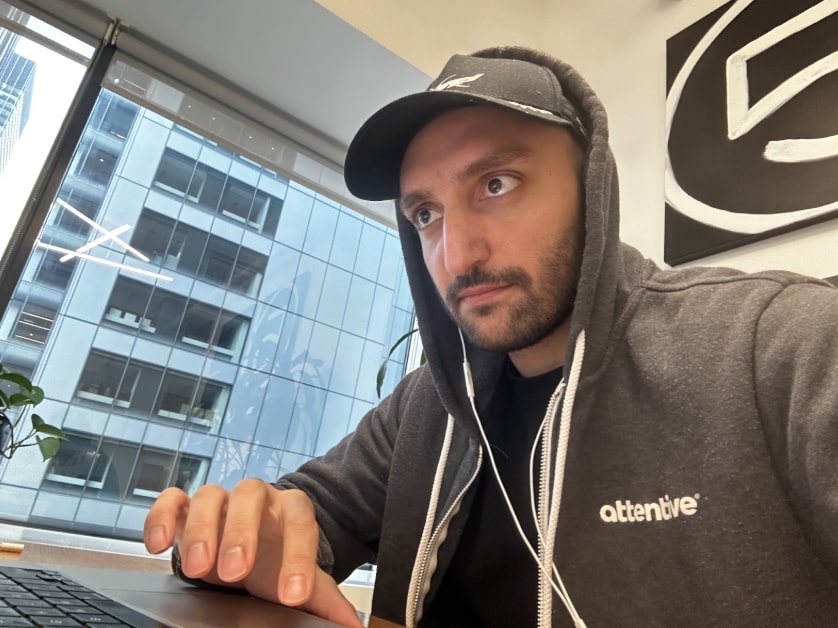
Okay, I won’t go off topic. Back to Hall.
Once you generate your report, you can create a free account. You’ll be asked to set up your workspace. It’s fairly quick. The fastest onboarding experience out of all of the tools we’ve went over so far.
Here, we can select our project objective (you can also start with a blank project).
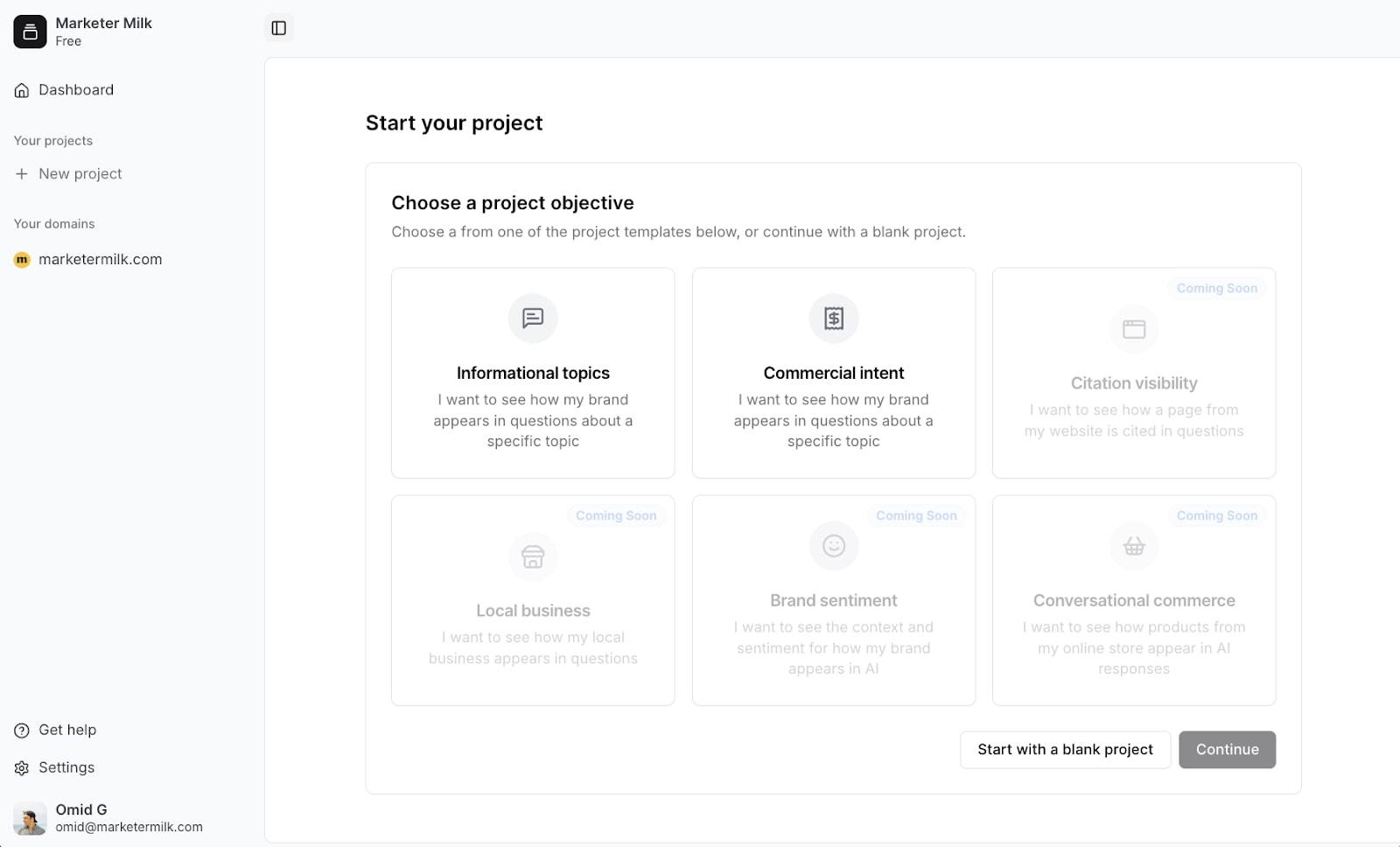
And here’s what it looks like when you load up a project:

You’ll then need to configure topics. When you add a topic (keyword), it will give you prompt templates and recommendations to track which is pretty neat.
I was actually blown away by this tool.
I only gave it one topic for my website, “ai marketing tools,” and it went ahead and automatically found prompts and how they’re showing up in LLMs. All on the free plan so far!
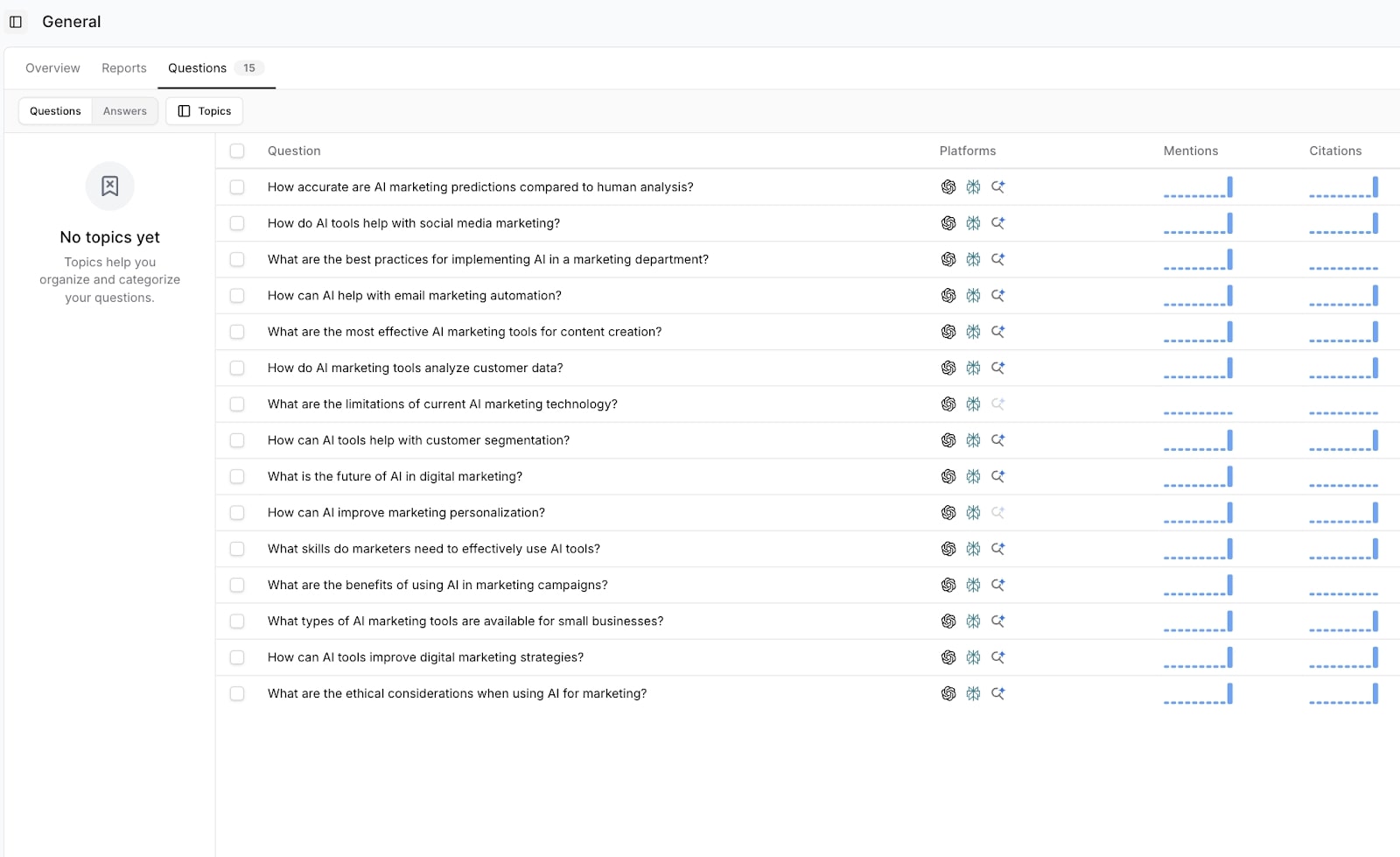
The ‘Mentions’ and ‘Citations’ chart shows how often you’ve shown up over the past 10 days. So because it was my first day adding this topic, it’s showing the ticker only once in the screenshot. But when you hover over the ticker, it tells you how many times you’re coming up.

The fact that they show both the AI mentions and citations side by side, and that it gave me prompt ideas based on just 1 keyword, is amazing. Hall is definitely up there in being one of the best AI monitoring tools.
Hall pricing
Here are Hall’s pricing plans:
- Lite: Free, includes 1 project with 25 tracked questions
- Starter: $239/month, includes 20 projects with 500 tracked questions
- Business: $599/month, includes 50 projects with 1,000 tracked questions
- Enterprise: $1,499/month, includes API access and more
As you can see, Hall has the most accessible pricing so far out of any AI brand monitoring tool (minus the free AI Product Ranking tool mentioned first). If you want to check out all the features of each plan, you can check out their pricing page here.
Hall rating and reviews
Here’s what users of Hall rate the platform on third-party review sites:
- G2: 5/5 star rating (from +2 reviews)
There aren’t a lot of third party reviews for Hall yet. It’s still a fairly new tool. But honestly, it’s in my top 3 best tools for AI visibility tracking.
⭐️ Marketer Milk score: 5/5 stars
6. Nimt.ai
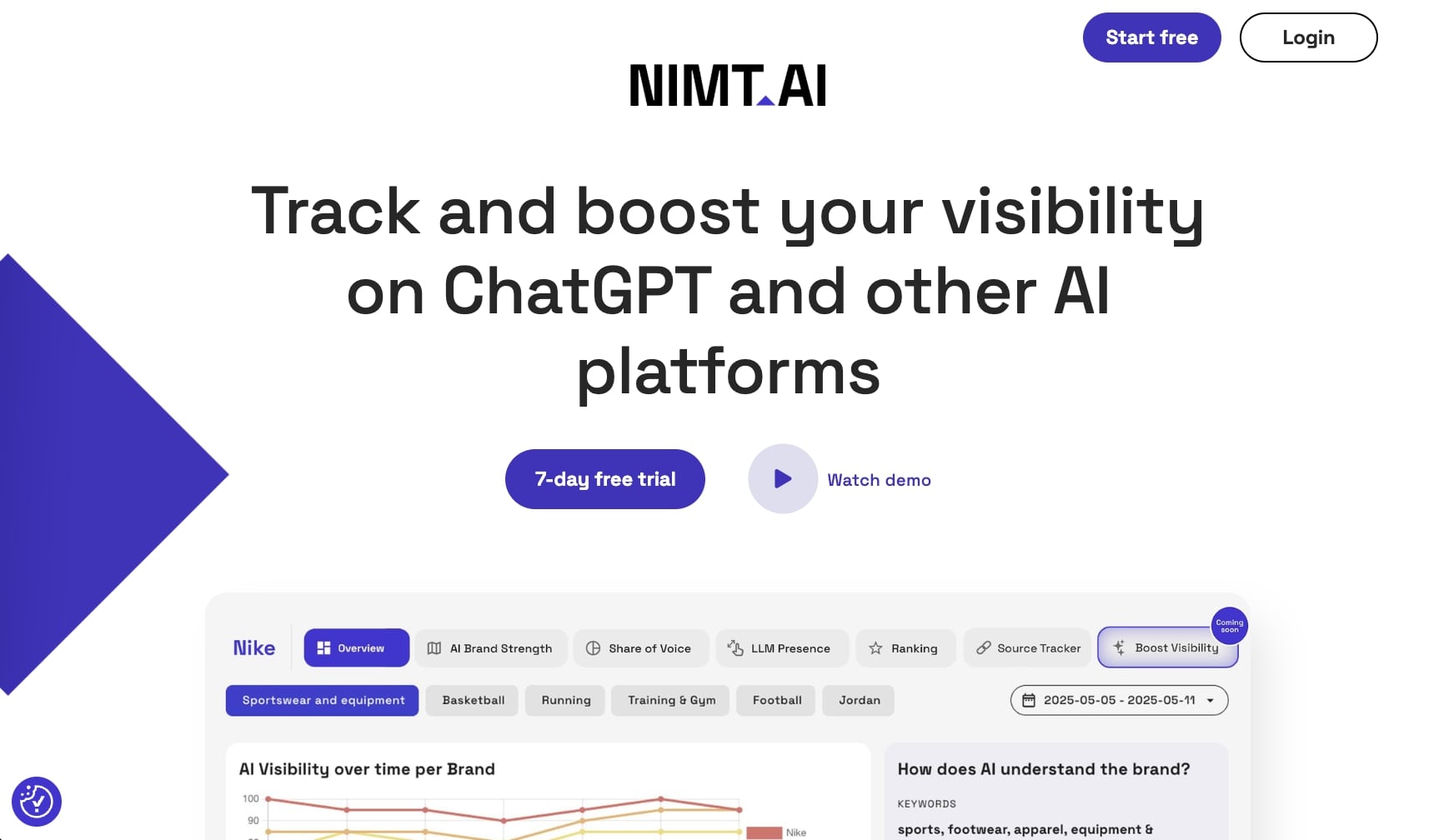
- Best for: B2C and DTC ecommerce brands
- What I like: Has a share of voice feature
- Pricing: Starts at $79 per month
Nimt.ai is another AI search visibility tracking tool that is fairly new. Just like many of the tools we’ve gone over so far, Nimt.ai helps you track prompts your brand is showing up for. But the great thing about this platform is that it helps you generate prompt ideas from topics your website is related to.
This is similar to Hall in that if you aren’t certain what types of prompts to be tracking, the platform gives you ideas. The cool thing about Nimt.ai is that it also gives you sentiment analysis and a total share of voice feature.

This is what classic brand monitoring tools have always done. And I’m surprised some of the tools we’ve gone over don’t have this as a feature. This makes it great for larger consumer brands and DTC (direct to consumer) ecommerce brands looking to understaind their brand positioning against competitors.
If you are a well known ecommerce brand, this is definitely a tool to look into and test out. They have a free 7-day trail.
Nimt.ai pricing
Nimt.ai currently doesn’t publicly show their pricing on their marketing site. But these are the current plans the offer:
- Starter: $79/month, up to 20 prompts tracked
- Pro: Starts at $179/month, up to 80-500 prompts tracked
- Enterprise: Custom pricing with custom features
As you can see, it is more on the budget-friendly side of things. Definitely a lot cheaper than most AI tracking tools.
Nimt.ai rating and reviews
Here’s what users of Nimt.ai rate the platform on third-party review sites:
- ProductHunt: 5/5 star rating (from +1 review)
There aren’t a lot of reviews of the platform online. But SaaSworthy has a pretty detailed breakdown if you want to check it out.
⭐️ Marketer Milk score: 4.2/5 stars
7. AthenaHQ
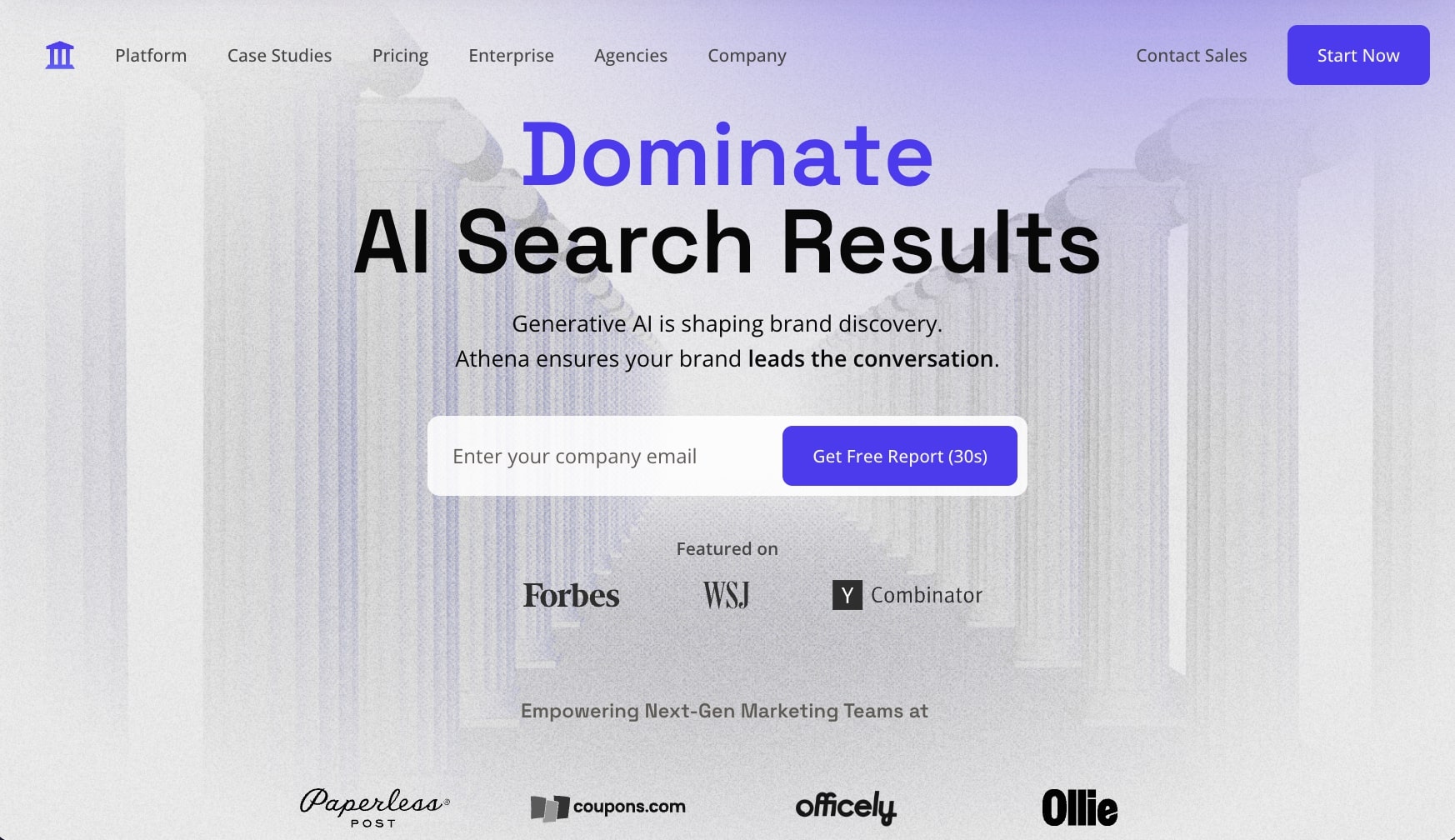
- Best for: SEO agencies
- What I like: Free report included, with great web analytics
- Pricing: Starts at $295 per month
AthenaHQ is an AI-powered GEO tracking platform. The software helps you track how your brand is not only showing up in search results, but also how it’s leading to conversions.
Similar to Hall, AthenaHQ has an amazing website design. You can tell the team has great taste when it comes to building products.
Once you onboard, you will be asked to input your website details and also add competitors. The competitors part is interesting because I have not seen other tools do this during the onboarding process. It does give you some ideas of competitors too.
Once everything loads, it gives you a free report that you can share with anyone on your team.
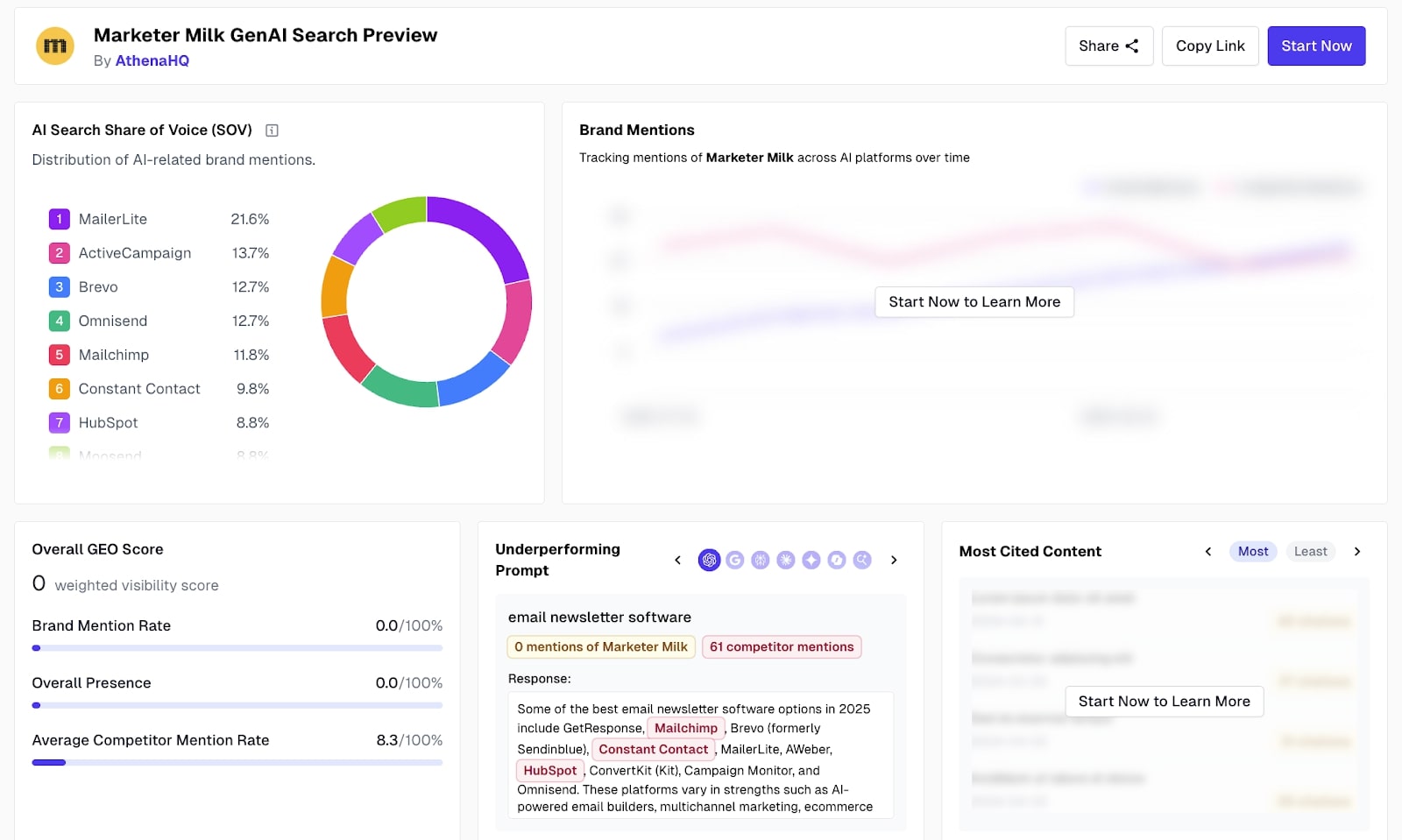
Once the free report is generated, you can create your actual account. And you’ll even get prompt ideas during the sign up process.
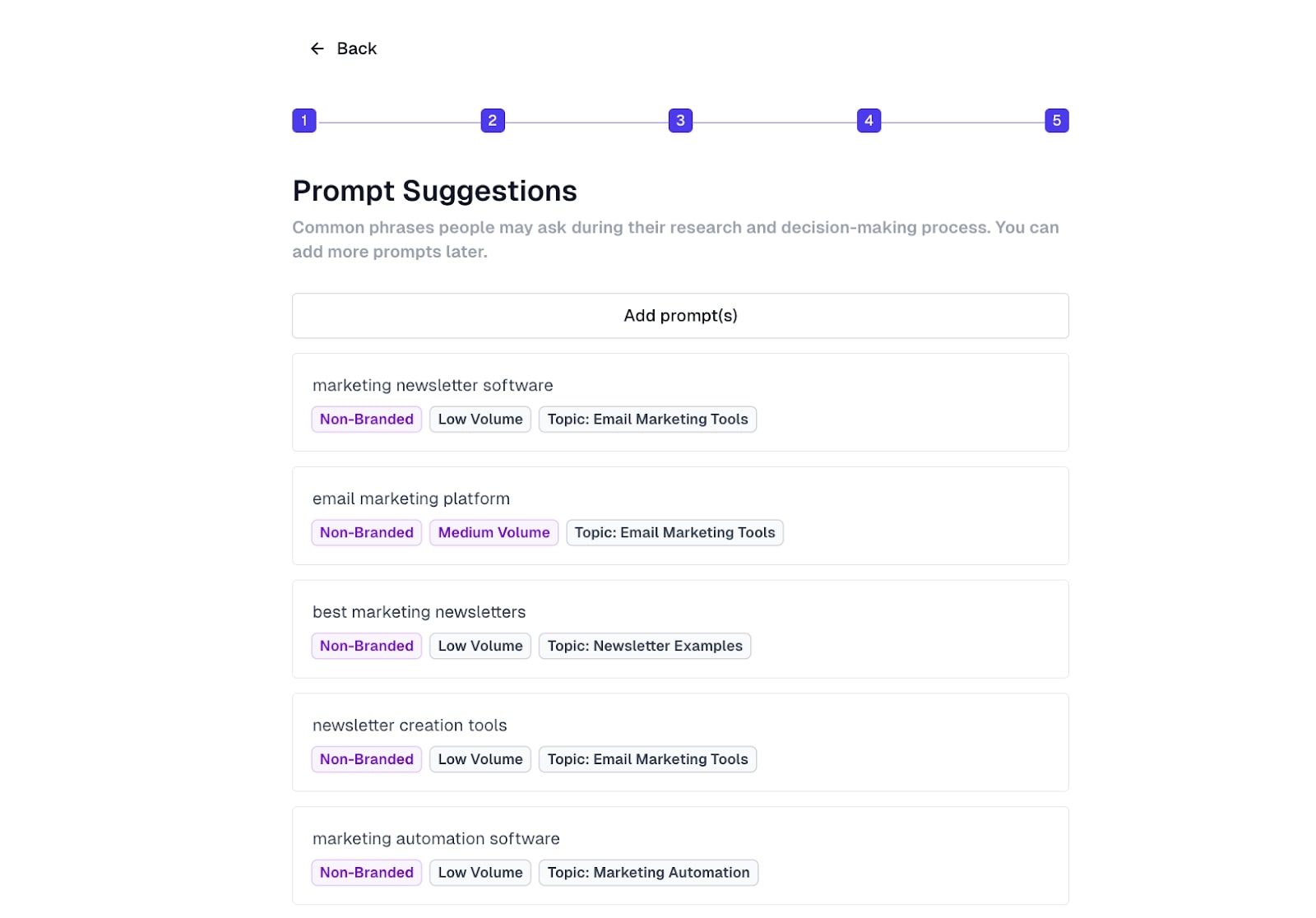
But once the platform fully loads, you’ll be able to view so many analytics. I’m actually surprised at how comprehensive the toolkit is, they have a lot of different web analytics features. I was thoroughly impressed.

The platform integrates well with existing workflows, making it easy to incorporate into your daily monitoring routine.
And the cool thing about AthenaHQ, compared to other tools, is that it includes unlimited seats in all plans. So if you’re an SEO agency, this is a great tool to use with your clients if you want to keep costs low.
AthenaHQ pricing
Here are AthenaHQ’s pricing plans:
- Starter: $295/month, includes 3,500 credits
- Growth: Starts at $595/month, includes 8,000 credits with a GA4 integration
- Enterprise: Custom pricing with unlimited credits and SSO
If you want to get a full breakdown of all the future, check out their pricing page here.
AthenaHQ rating and reviews
Here’s what users of AthenaHQ rate the platform on third-party review sites:
- G2: 5/5 star rating (from +11 reviews)
- Slashdot: 5/5 star rating (from +13 reviews)
As you can see, AthenaHQ has got some great reviews from its users. They’re doing something right.
⭐️ Marketer Milk score: 4.8/5 stars
8. Mentions
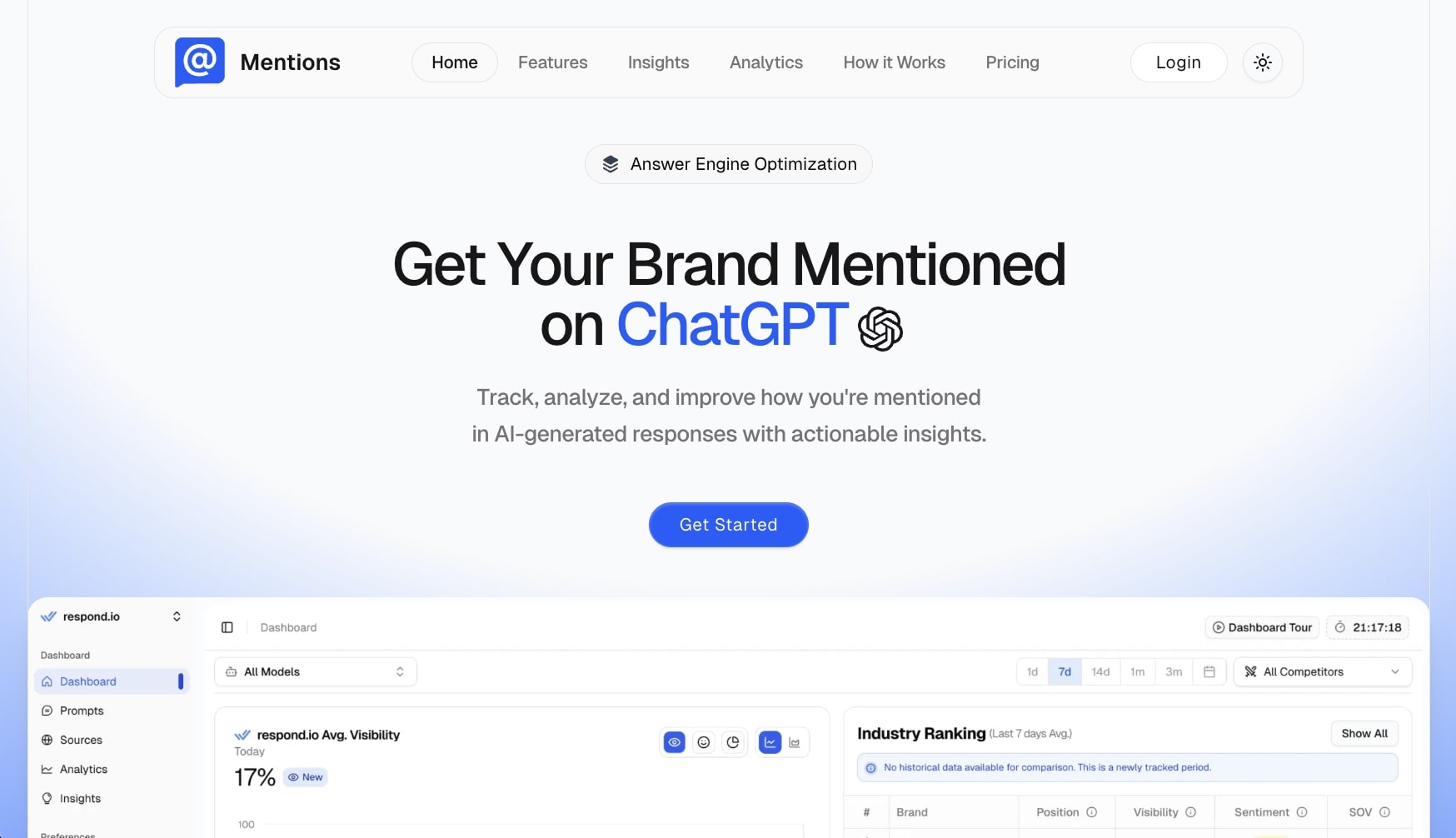
- Best for: Startups exploring their AI visibility
- What I like: Easy to use and budget-friendly
- Pricing: Starts at $49 per month
Mentions is an answer engine optimization platform that helps you track and optimize your website for AI search. Created by the team at Contact Studios, an SEO agency, the platform is a great entry point to using AI monitoring software because of its budget friendly price tag.
The platform is very lightweight and has a great UI/UX. It also gives you everything you need, similar to tools like Peec AI or Hall. This is like a more budget-friendly version of those tools.
It’s similar to other tools like that you have to give it prompts to track, but it does use AI to give you some ideas of what to track. These might not always be what people are actually searching for in LLMs, so take the recommendations with a grain of salt.
There’s also a great demo video on their homepage that I recommend you check out to see how the platform works.
Mentions pricing
Here are Mentions pricing tiers:
- Starter: $49/month, includes 25 prompts tracked
- Pro: $99/month, includes 50 prompts tracked
- Business: $199/month, includes 100 prompts tracked
If you want to see what each plan offers, check out their pricing section here.
Mentions rating and reviews
At the time of writing this, there are no public reviews on Mentions. There is another company called Mention, which is a social media monitoring tool. The name is really close to Mentions, however they are different products.
⭐️ Marketer Milk score: 4.7/5 stars
9. BrandLight
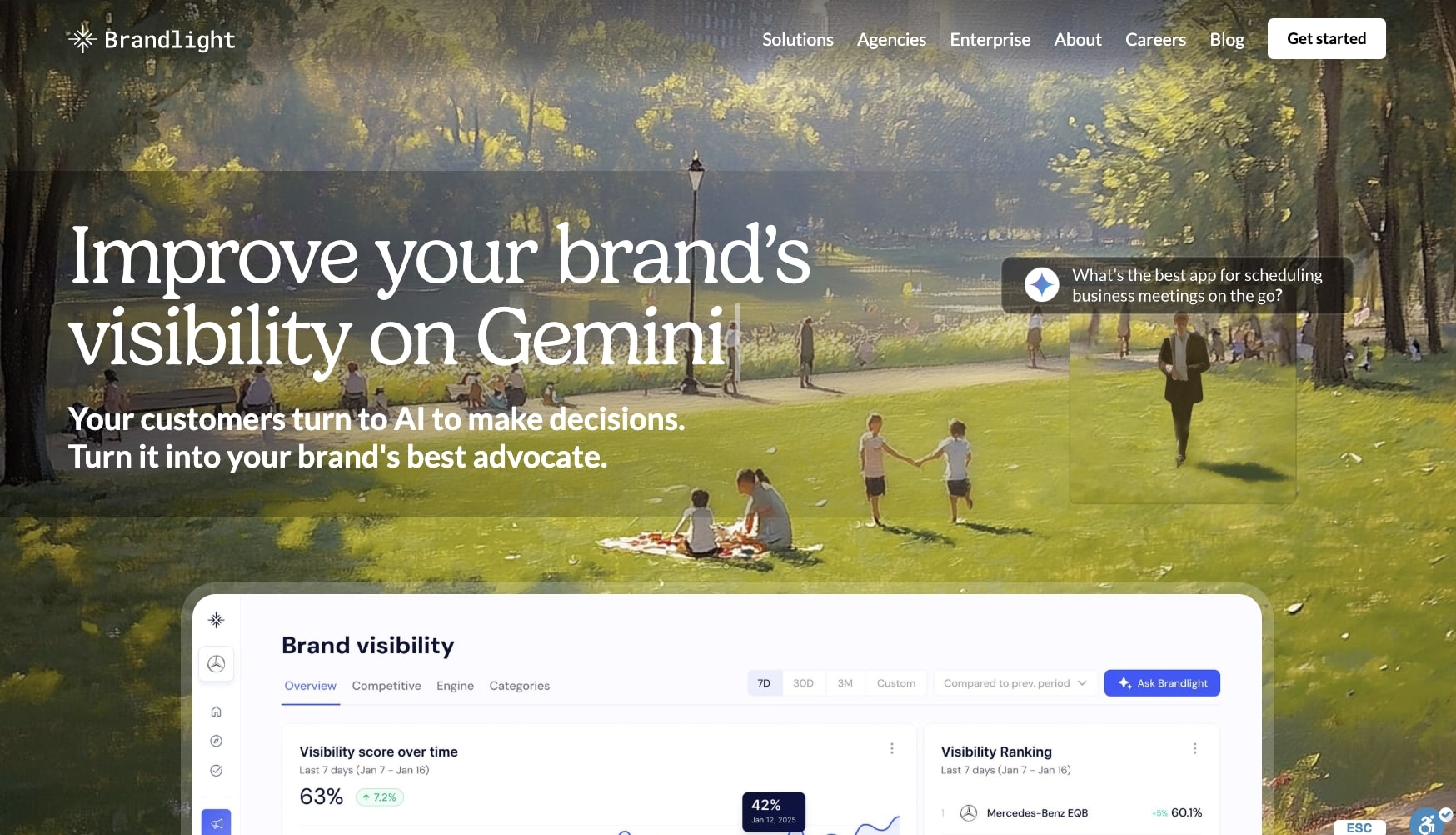
- Best for: Large content agencies
- What I like: Built-in AI content optimization tools
- Pricing: Request for custom quote
BrandLight is an AI visibility optimization platform that came out of stealth mode in April 2025 with a $5.75 million funding round. Besides the website looking so peaceful and human, the cool thing about this platform is that it has a built-in AI content optimization tool.
Only one other tool on this list so far has this feature. But what BrandLight also does is include an A/B testing feature so you can actually see if these optimizations are improving your content creation efforts and visibility.
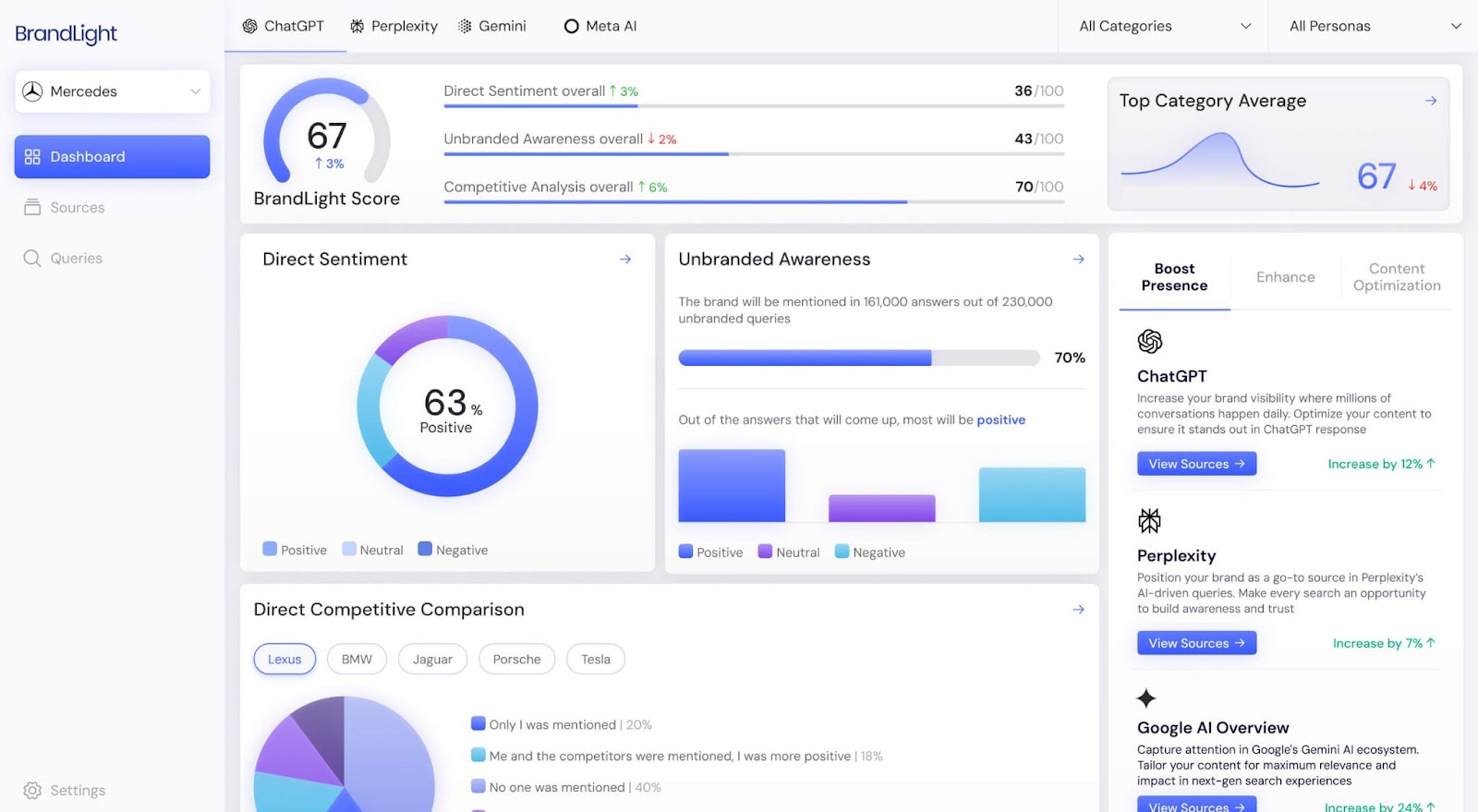
The tool does lean more on the enterprise side, so I would say it’s best for large marketing agencies that are meaning huge consumer brands. If Don Draper was around to see AI, this is the platform he’d probably pick for his agency (I hope people got that reference).
BrandLight pricing
BrandLight doesn’t publicly show any pricing options. You’ll need to fill out a form on their website to get a custom quote.
BrandLight rating and reviews
At the time of writing this, there are no third-party reviews of BrandLight. It looks like it’s a tool used by huge enterprises so it’s a bit inaccessible for most people to use.
I personally did not test this tool (the only platform I didn’t actually use myself on this list). But I included it because I know it’s being mentioned a lot and used by some large agencies. And if you work at a large agency, it might be worth looking into and getting a demo.
⭐️ Marketer Milk score: 4.6/5 stars
10. Google Analytics 4 (with an LLM filter)
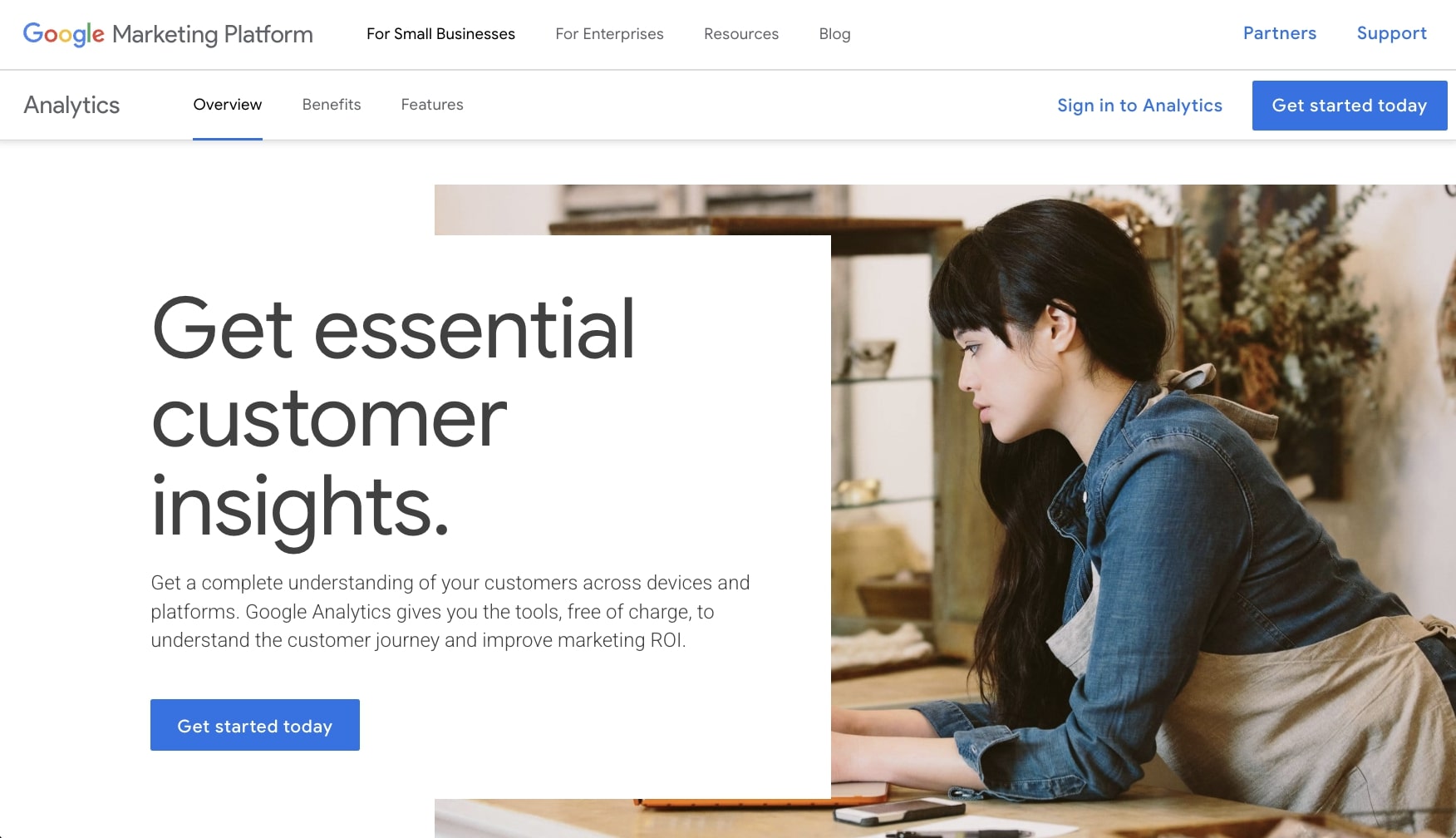
- Best for: Any website
- What I like: Uses your own first-party data
- Pricing: Free
Last but not least, we have my favorite one! Well, it’s not the best in tracking prompts and stuff. But, it is my favorite tool in that you probably already have Google Analytics 4 (GA4) installed on your website. And it’s probably already populated with a ton of web analytics.
What you can do in GA4 is create a dedicated filter for LLMs. This will allow you to see traffic from different referral sources like ChatGPT, Perplexity, and more.
Here’s how to do it:
- Go to the ‘Acquisition’ tab and then click on ‘Traffic acquisition’
- In the top left, click on ‘Add filter’
- For the Dimension, select ‘Session source / medium’
- For Match Type, select ‘Match Type’ to be ‘matches regex’
- For the Value, paste the regex below
(.*gpt.*|.*chatgpt.*|.*openai.*|.*neeva.*|.*writesonic.*|.*nimble.*|.*outrider.*|.*perplexity.*|.*google.*bard.*|.*bard.*|.*edgeservices.*|.*gemini.*google.*)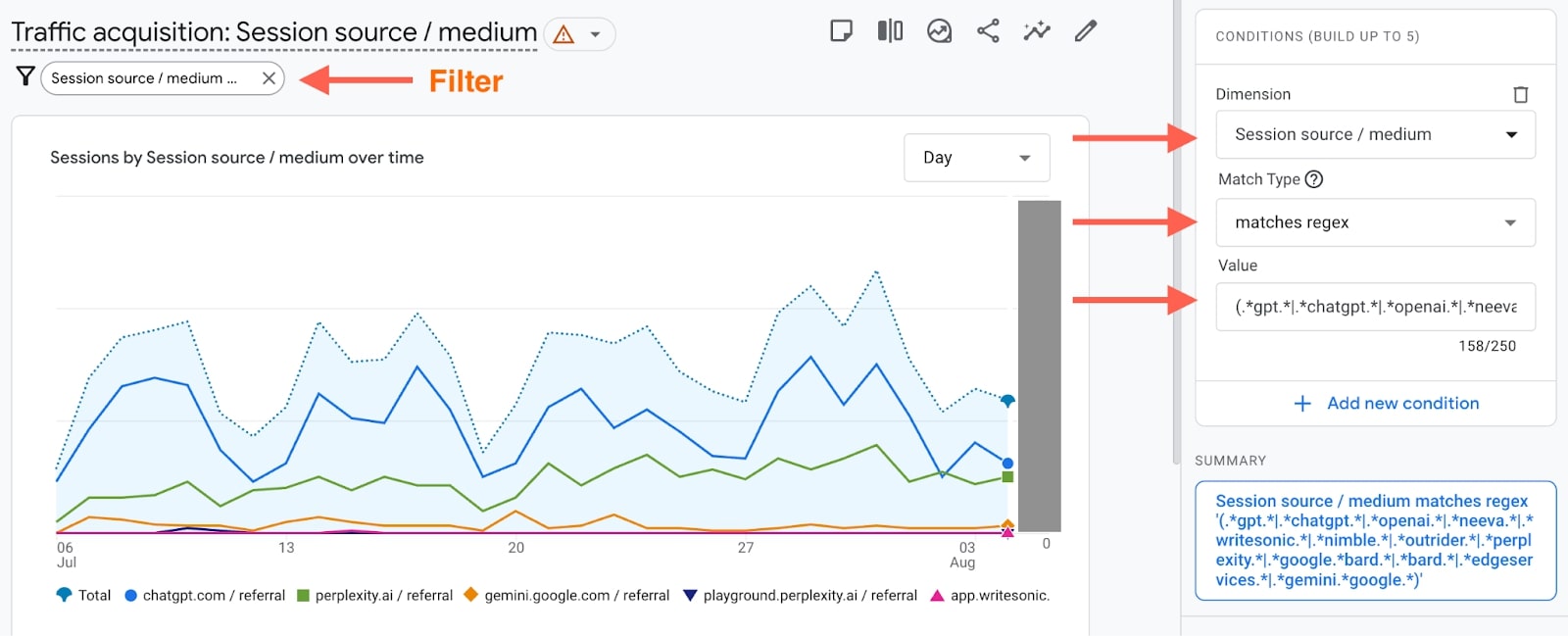
Now that this filter is applied, you might only see a few results in the rows below. This will show the total LLM traffic, but we want to break it down by the actual LLM.
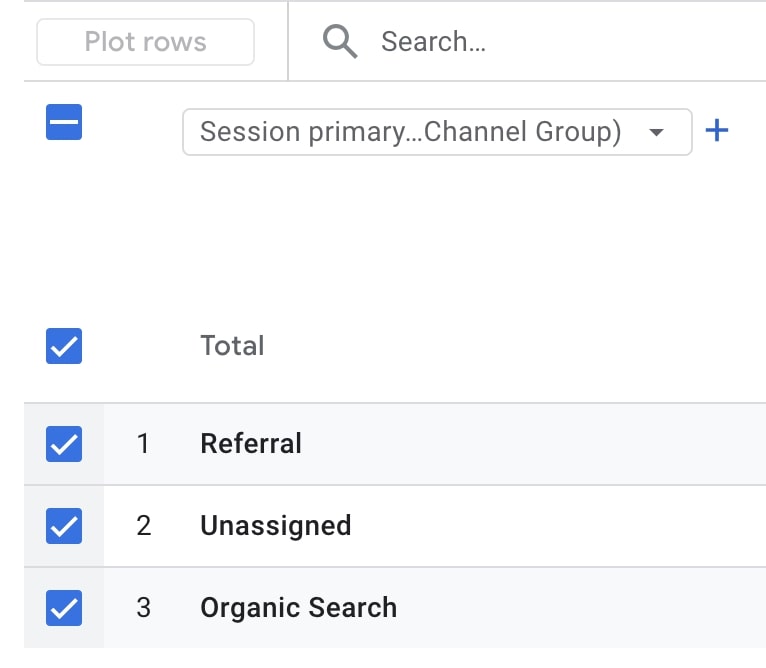
So now, we need to click on “Session primary…” and change it to ‘Session source / medium’.
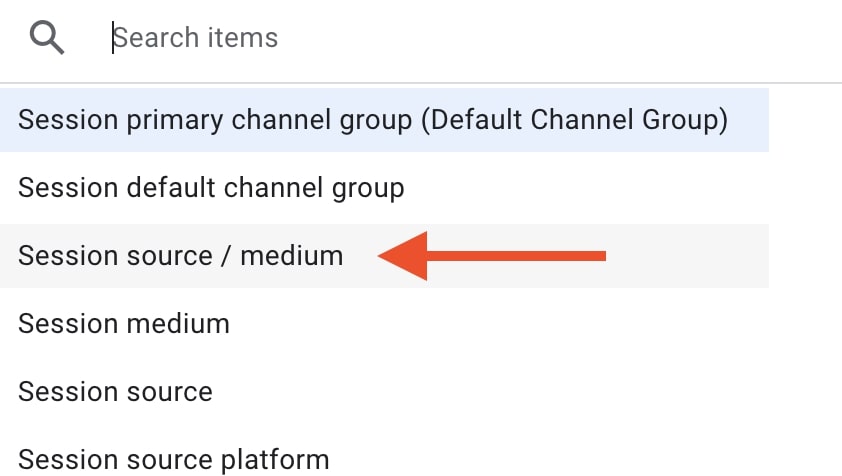
And now, we can see our traffic split up by LLMs!
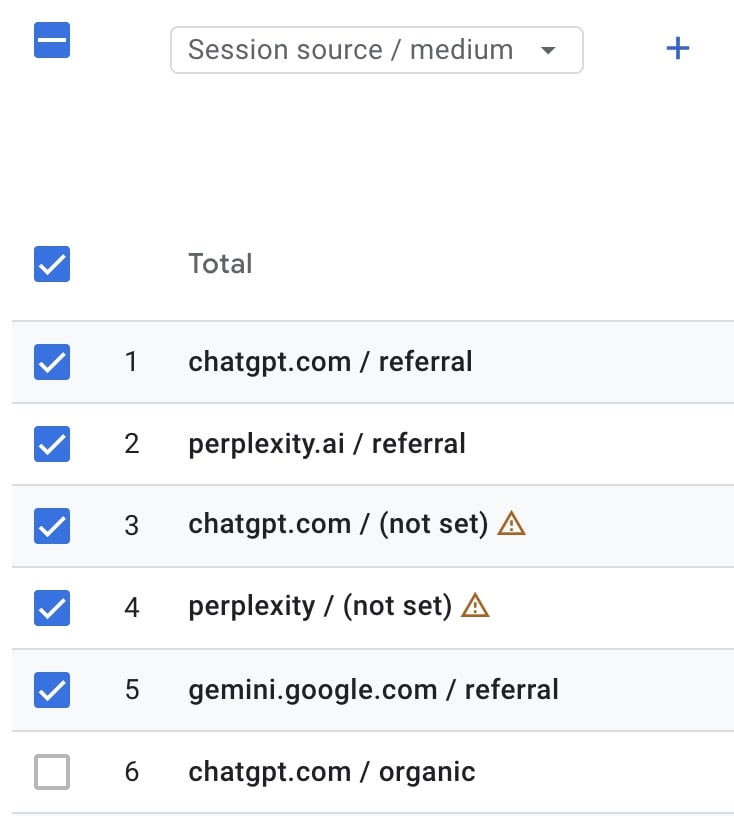
But now we want to break this down by individual pages on our site. So we want to click the plus icon (see screenshot above). And from there we want to add the option ‘Page path and screen class’. And now we are good to go!
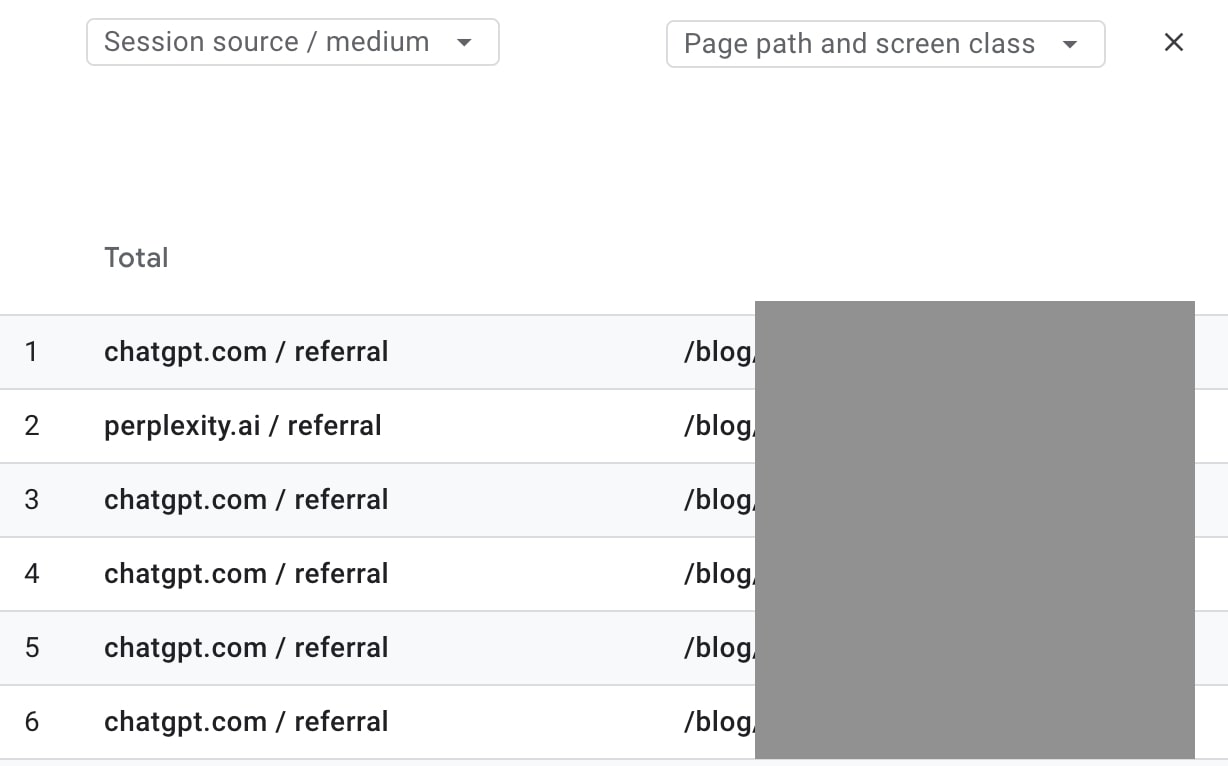
This will now show you individual pages from your website, and the LLM they’re getting traffic from. Save it and bookmark it.
Super powerful stuff!
This entire strategy will help you see what pages are actually getting traffic from what LLMs. And from there, you can reverse engineer prompts that the page would most likely show up for (you can use Google Search Console per page to see what keywords you’re ranking for for those prompt ideas).
So this tool is best paired with a more advanced paid AI visibility platforms mentioned above.
I’m not going to include a pricing and review section for GA4 because, well we all know what it is (and it’s free).
Hopefully you learned something!
⭐️ Marketer Milk score: 4.8/5 stars
How to show up in AI search engines
If you want to show up in AI search engines you need to do one thing and one thing only: focus on Google.
ChatGPT used to use Bing for its results, but as of recently people are finding out that it's using Google search. This means if you're following SEO best practices for Google, you will show up in AI search results.
But I know that's not helpful advice. Because most people do Google SEO wrong to begin with. I already wrote a blog post about this that you can check out here. And I have some YouTube videos on how to write blog posts that rank in Google and ChatGPT.
Look, I'll be honest with you (because that is what I always aim to do). After spending months testing all these fancy AI monitoring tools, here's what I've learned: the fundamentals still matter most.
In my opinion, SEO is more of a craft than a science.
Yes, these tools are cool. Yes, they give you interesting data. But at the end of the day, if you're not showing up in Google, you're probably not showing up in AI search either.
And this is actually a relief. You don't need to learn some completely new strategy. The same topical authority approach that works for Google SEO works for AI visibility. Write comprehensive, helpful content. Build authority in your niche. Get quality backlinks. That's it.
I've seen so many people get caught up in "optimizing for AI" when they haven't even nailed the basics of traditional search, or build out a real SEO strategy. These tools only make sense if you're a large brand with tons of branded search already. If you're a brand new startup or a small company, it does not make sense to use these tools in their current form.
I still question the accuracy of these tools. As many times I'll test a prompt in a private incognito window by going to chat.com and then the results are sometimes different from what these AI monitoring tools show when they do a search in the backend via an API.
The results are not consistent. And it can easily create vanity metrics for businesses. My recommendation is to focus on ethical, white-hat SEO fundamentals. Forget this GEO stuff, it's not real. I get tons of traffic from LLMs and I never once focused on "optimizing" for them. All I care about is Google, and I show up in Bing, DuckDuckGo, Perplexity, ChatGPT, Yandex, Claude, and some other niche search engines.
These AI monitoring tools are interesting, but they're not essential. Not yet, anyway. Save your money, focus on creating great content, and let the AI engines find you naturally. That's what's been working for me, and it'll probably work for you too.
Catch ya in the next one! Much love.
Get the weekly newsletter keeping +33,000 marketers in the loop.



